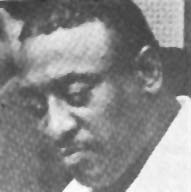

Revision note.We are adding some information on reissues on Vee-Jay's Oldies 45 subsidiary, which was active from 1963 to 1965. We are updating our information on several releases from 1957 and 1958: multiple Falcons and Abners, and Vee-Jay 257, 258, 261, 278, 281, and 285.
We pick up the Al Smith story as his studio activities reached high tide. Part I of this discography covered Al's early years through 1955.
In 1956 Al Smith's band was moderately active in the clubs. And during the same year he made no fewer than 17 recording sessions. Parrot was on its last legs; after a Paul Bascomb session in July 1955, the company went back to Red Saunders to supply its house band during its declining months. However, Smith was able to pick up 4 for United and States; those labels were winding down and he led his last session for them in August 1956. The other 13 sessions were all for Vee-Jay; they produced two more big hits in "Up on the Mountain" by the Magnificents and "Oh What a Nite" by the Dells.
On January 1, Al Smith's band appeared in a package show at the Park City Bowl. Among the headliners were Miles Davis and his quintet.
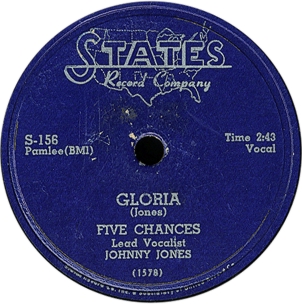
The Five Chances: Reggie Smith, Johnny "Chubby" Jones, Howard Pitman, Jesse Stafford, Ronald Johnson (voc); with prob. Al Smith (ldr); Red Holloway (ts); McKinley Easton (bars); Norman Simmons (p); Lefty Bates (eg); prob. Quinn Wilson (b); Vernel Fournier (d).
Boulevard Studios, Chicago, January 7, 1956
| 1576 | Sugar Lips | States 156, Delmark DE-703 [CD], United U-163 [CD], Famous Groove [F] FG.971016 [CD] | |
| 1577 | Bashful Boy | Delmark DE-703 [CD] | |
| 1578 | Gloria | States 156, Delmark DE-703 [CD], United U-163 [CD], Famous Groove [F] FG.971016 [CD] |
Session information from Koester's discography; personnel of the Five Chances from Pruter's notes to Delmark DE-703. States 156 was released in May 1956. Contrary to what is stated on the label of this release, Howard Pitman did not sing lead on "Sugar Lips"; in interviews with Robert Pruter, both Johnny Jones and Howard Pitman insisted that Jones sang the lead on both sides. Famous Groove FG.971016 is a bootleg CD from 1997 titled Groups Three Plus; it also includes material that the Five Chances recorded for Chance and Federal, along with sides by the Five Blue Notes and the Five Echoes. United U-163 is a bootleg CD from 1999 titled Rare Windy City R&B Vocal Groups From the street-corners of Chicago Volume One.
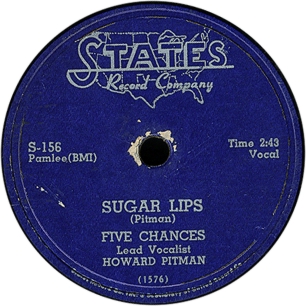
All instrumentalists identified by ear (the piano on the date was a substandard instrument, to put it mildly!). Chubby Jones was responsible for the regular lead and the "high wailing lead" on Gloria.

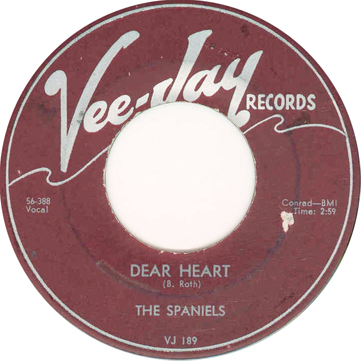
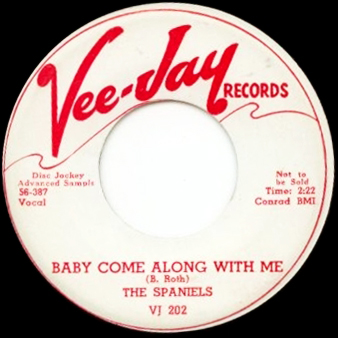
The Spaniels: James "Pookie" Hudson, James "Dimples" Cochran, Willis C. Jackson, Gerald Gregory (voc) with Al Smith and his Orchestra: Al Smith (ldr): James "Red" Holloway (ts); McKinley Easton (bars); Horace Palm (p); Lefty Bates (eg); prob. Quinn Wilson (b); Vernel Fournier (d).
Universal Recording, Chicago, January 19, 1956
| 56-387 | Baby Come Along with Me (Roth) | Vee-Jay 202^ | |
| 56-388 | Dear Heart (Roth) | Vee-Jay 189^, Lost Nite LP 137, Vee-Jay NVD2-704, Collectables CD 7243 | |
| 56-389 | Do You Really (Hudson) | Vee-Jay 178, Vee-Jay LP 1002, Vee-Jay NVD2-714, Collectables CD 7243 | |
| 56-390 | Why Won't You Dance (Hudson-Bracken) | Vee-Jay 189^, Charly LP 1021, Charly CD 222, Collectables CD 7244 | |
| 56-391 | False Love (Roth) | Vee-Jay 178, Lost Nite LP 137, Charly LP 1021, Charly CD 222, Collectables CD 7244 | |
| 56-391 [alt.] | False Love (Roth) | Vee-Jay NVD2-704 |
Our session information is from the MFD Files, except the Spaniels' line-up, which comes from Doowop: The Chicago Scene.
Vee-Jay 178 was issued in January 1956 and Vee-Jay 189 followed in April. Vee-Jay 202 was released in July 1956—all dates according to Bob Ferlingere. For some reason, "Baby Come Along with Me" on Vee-Jay 202 has never been reissued. The flip of 202 was "Since I Fell for You" (which went all the way back to the Spaniels' debut on May 4, 1953, with a Red Saunders group.)
Vee-Jay LP 1002 was called Goodnite, It's Time To Go, and was released in 1957 (according to Pruter; 1959 according to Ferlingere). Lost Nite LP 137 is called Spaniels, released in 1971. Charly LP 1021 is called Great Googley Moo and was released in 1981. Charly CD 222 is called Play It Cool, released in 1990. Vee-Jay NVD2-704, The Spaniels: Goodnight Sweetheart Goodnight, was released in 1993. Collectables CD 7243, The Very Best of the Spaniels Part 1, and CD 7244, The Very Best of the Spaniels Part 2, are 2000 releases.
"Do You Really" has no instrumental solos, but shows off Vernel Fournier's parade drumming. "False Love" as issued has no solos; the longer alternate take has a tenor sax introduction by Red Holloway, and was probably not used on account of the Spaniels' raggedy final ensemble. The version of "Dear Heart" on NVD2-704 also purports to be an alternate take; to be checked.
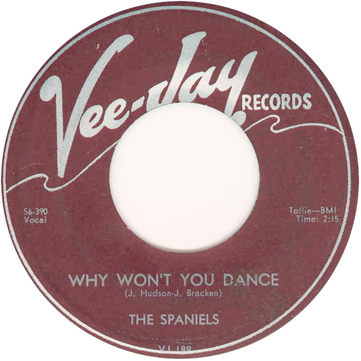
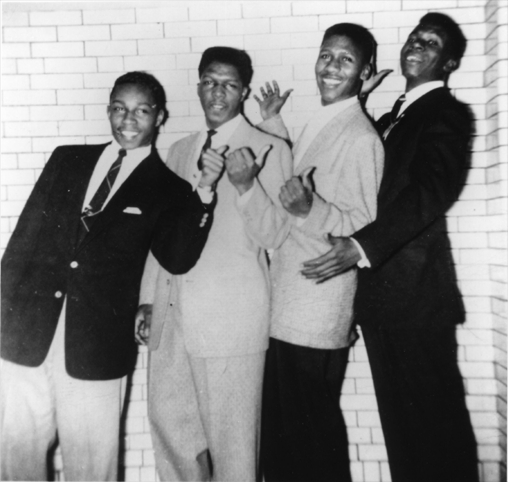
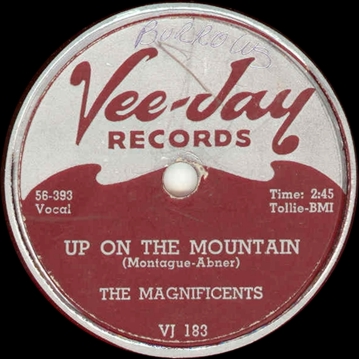
Johnny Keyes, Thurman "Ray" Ramsey, Fred Rakestraw, Willie Myles (voc); with Al Smith & his Orchestra: Al Smith (dir); Red Holloway (ts); McKinley Easton (bars); Horace Palm (p); Lefty Bates (eg); prob. Quinn Wilson (b); Vernel Fournier (d).
Universal Recording, Chicago, January 21, 1956
| 56-392 | Yes, She's My Baby | Solid Smoke LP 8030, Vee-Jay NVD2-715, Famous Groove FG.971002 [CD] | |
| 56-393 | Up on the Mountain (Montague-Abner) | Vee-Jay 183, Vee-Jay 367, Vee-Jay LP 1001, Solid Smoke LP 8030, Vee-Jay CD 709, Famous Groove FG.971002 [CD], Collectables CD 7204 | |
| 56-394 | Lost Lover (N. Nathan) | Vee-Jay 235, P-Vine Special [J] 1412 [CD] | |
| 56-394 [alt.] | Lost Lover [alt.] | Vee-Jay NVD2-715 [CD] | |
| 56-395 | Why Did She Go (Montague-Abner) | Vee-Jay 183, P-Vine Special [J] 1412 [CD], Collectables CD 7204 | |
| 56-395 [alt.] | Why Did She Go? [alt.] | Vee-Jay NVD2-715 [CD], Famous Groove FG.971002 [CD] |
The vocal lineup and titles are from Pruter; matrix numbers from the MFD Files.
Vee-Jay 183 was a 45-rpm single released in late April 1956; Vee-Jay 235 followed in January 1957. Vee-Jay 367 was a single released in October 1960; "Up on the Mountain" was the B side and a previously unreleased number by a different Magnificents group (recorded in 1958; see below) was the A side. Interestingly, Vee-Jay 367, appearing long after Montague left Chicago, awarded the composer credit for "Up on the Mountain" to J. Bracken.
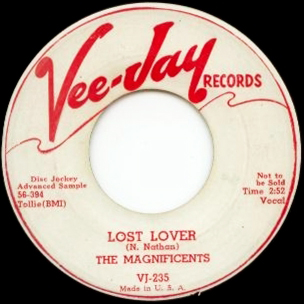
"Up on the Mountain" was rereleased as one of two guest tracks on Vee-Jay LP 1001, Crazy Little Mama by the El Dorados. Solid Smoke LP 8030 was issued in 1984, under the title Magnificents and Rhythm Aces: Fifteen Cool Jewels. Vee-Jay CD 709, A Taste of Doo Wop Volume 1, appeared in 1993. Vee-Jay CD 715, A Taste of Doo Wop Volume 2 appeared that same year. Famous Groove FG971002 is a French compilation called Vee-Jay Doo Wop Volume 2: Bim Bam Boom! It was released in 1997. Collectables CD 7204, Vee-Jay Rhythm & Blues: The Early Years Part One, is a 2000 release. We are assuming that the initially issued take of "Why Did She Go?" is included in this collection, but this remains to be checked.
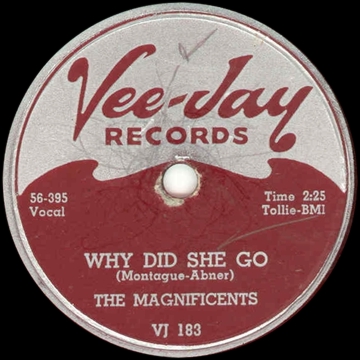
Although he is listed in the MFD Files, Lefty Bates is not audible on the titles that have been checked ("Lost Lover" still needs to be heard). Red Holloway solos on "Yes, She's My Baby." There are no solos on "Up on the Mountain," but Vernel Fournier gets some prominent drum fills. No solos at all on "Why Did She Go."
The Sheppards (voc): George "Sonny" Parker (first lead); John Pruitt (second lead); James Dennis Isaac (first tenor); Nathaniel Tucker (bass); Kent McGhee (baritone); Oscar Boyd (second tenor); accompanied by Al Smith (ldr); Tommy Badger (ts); McKinley Easton (bars); poss. Horace Palm (p); Lefty Bates (eg); prob. Quinn Wilson (b); Vernel Fournier (d).
Universal Recording, Chicago, February 1, 1956
| 1572-7 | Mozelle (Sheppard) | United 198, United U-143 [CD], Delmark DE-761 [CD] | |
| 1573-5 | Just Let Me Love You | United U-143 [CD], Delmark DE-761 [CD] | |
| 1574-5 | Sherry (Sheppard) | United 198, United U-143 [CD], Delmark DE-761 [CD] | |
| 1575-2 | Pretty Little Girl | Delmark DE-761 [CD] |
We have added this session to the Al Smith list after hearing the bootleg reissues on United U-143, a 1999 CD titled Rare Windy City R&B Vocal Groups From the street-corners of Chicago Volume Two. A complete legitimate reissue of this session is available on Delmark DE-761, Bang Goes My Heart: The Moroccos and Other Great Groups on United, which came out in September 2002. "Sherry" has no instrumental solos; "Mozelle" includes an unusual break for the string bass (enough to prove that it isn't Al Smith!); "Just Let Me" includes a tenor sax intro and solo. The tenor soloist is rougher-sounding than Lucius Washington; Pruter's sources identify him as one Tommy Badger. "Pretty Little Girl" has a nice tenor sax solo by Tommy Badger with accompaniment by the baritonist (this was a Mac Easton specialty). The affirmative drumming on "Pretty Little Girl" has to be the work of Vernel Fournier.
The vocal group personnel is drawn from Doowop: The Chicago Scene by Robert Pruter. Pruitt sings lead on "Mozelle"; on "Sherry" Isaac sings lead and the singers' roles are shuffled somewhat.
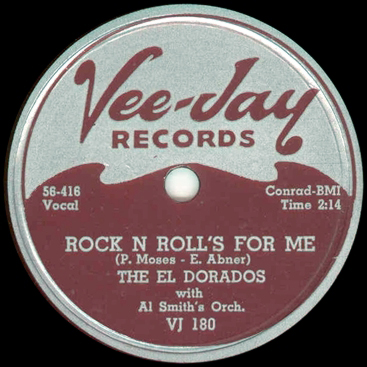
The El Dorados: Pirkle Lee Moses, Jewel Jones, Louis Bradley, James Maddox (voc) acc. by Al Smith Orchestra: Al Smith (ldr); Red Holloway (ts); McKinley Easton (bars); Horace Palm (p); Lefty Bates (eg); prob. Quinn Wilson (b); Vernel Fournier (d).
Universal Recording, Chicago, February 10, 1956
| 56-414 | It's No Wonder | Solid Smoke LP 8025, P-Vine Special [J] CD 1412, Collectables CD 7245 | |
| 56-415 | Love of My Own | Solid Smoke LP 8025, P-Vine Special [J] CD 1412, Vee-Jay NVD2-709, Famous Groove FG.971002 [CD], Collectables CD 7245 | |
| 56-416 | Rock N Roll's for Me (P. Moses-E. Abner) | Vee-Jay 180, Vee-Jay LP 1001, Solid Smoke LP 8025, Charly LP 1022, Vee-Jay NVD2-702, Collectables CD 7245 | |
| 56-417 | She Don't Run Around | Charly LP 1022, P-Vine Special [J] CD 1412, Vee-Jay NVD2-702, Famous Groove FG.971001 [CD], Collectables CD 7245 [?] |
Our sesssion information is drawn from the MFD Files. Vee-Jay 180 was a single released in February 1956. Famous Groove FG971002 is a French compilation called Vee-Jay Doo Wop Volume 2: Bim Bam Boom! It was released in 1997. Charly LP 1022 was titled Bim Bam Boom. P-Vine Special CD 1412 was a Japanese compilation, issued in 1992 under the title Vee-Jay Records: Ten Years of Chicago Street Corner: Boom Diddle Boom. Vee-Jay CD 709 was released in 1993 as A Taste of Doo-Wop: Volume One. Collectables CD 7245, The Very Best of the El Dorados, is a 2000 release.
"Rock 'n' Roll's for Me" includes a guitar solo by Lefty Bates, a tenor sax solo by Red Holloway, and (unusually for an Al Smith-led doo-wop) a baritone sax solo by Mac Easton.
It is not clear which version of "She Don't Run Around" is included in the Collectables set.
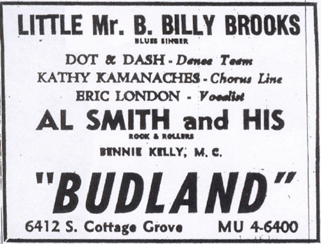
On March 19, 1956, Al Smith and His Rock and Rollers took over from Sun Ra's octet at Cadillac Bob's Budland, in the basement of the Pershing Hotel. Smith was a headliner in the first ad to refer to the establishment as Budland instead of Birdland (under pressure from the original Birdland in New York City, Cadillac Bob had been looking for a new name since mid-February). A story in the Defender for April 21 had Al Smith's Band backing Billie Holiday and Ben Webster there. We know exactly which dates Smith played in the earlier part of his run, because he was called on the carpet by Local 208 for accepting less than Union scale for them from Cadillac Bob.
Mr. Al Smith appeared before the Board as notified, to explain why the prices for three contracts with Birdland varied.
For instnace, the contract for March 19, 1956 was $148.50 and this price was changed to $108.90. The contract for March 23, 24, and 25, 1956, was for $445.50 and the price should have been $475.20. The contract for March 30, 31, and April 1, 1956 was for $438.75 and the price should have been $475.20.
...
Smith explained that he had been having financial difficulties and had almost lost his home because he was four months behind in the payments and he wasn't thinking clearly. He admitted that he didn't know that the leader was to receive double salary when more than six musicians were employed. That is the reason why the contracts did not show the price of $475.20.
However, under direct questioning he admitted that he had made a verbal agreement to work for $446.00 and the contracts were made up by the girl that works for Cadillac Bob.
The Board discussed the matter at length with Smith and made it quite clear to him that they felt as though he had entered into collusion with Cadillac Bob for the purpose of defeating the Local's wage scale. (Local 208 Board meeting minutes, April 19, 1956, p. 2.)
The dispute was obviously resolved to Local 208's satisfaction, for Smith posted a new contract on April 19 and advertisements kept putting him at Budland through the first week of May. A "Rock and Roll Show" was originally planned to begin on April 11; Cadillac Bob had probably wanted to use the Smith band for that. But the plans were scrapped in favor of extending Webster and Holiday's appearances. It appears that Sun Ra returned to Budland when Smith left. The Budland experience seems to have soured Al Smith on long-term club engagements. He promptly redirected his attention to the recording studios, not showing up on the Local 208 contract list again for the rest of the year.
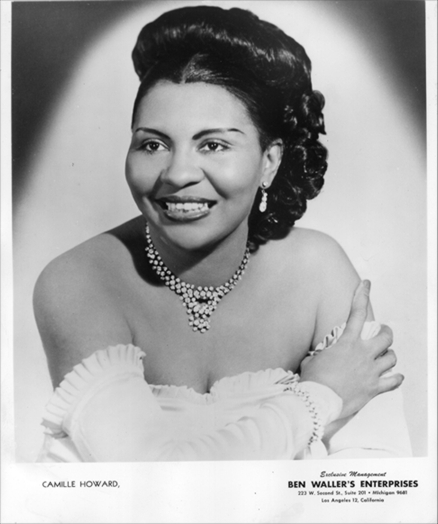
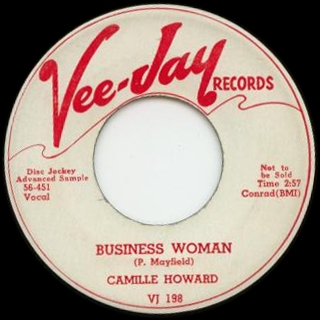
Camille Howard (p, voc); Al Smith (ldr); Leon Washington (ts); McKinley Easton (bars); Lefty Bates (eg); prob. Quinn Wilson (b); Al Duncan (d).
Universal Recording, Chicago, May 1, 1956
| 56-451 | Business Woman (Percy Mayfield) [CH voc] | Vee-Jay 198, JEMF LP 110, Charly CRB 1079, P-Vine Special [J] PCD 5271/4, Collectables CD 7270 | |
| 56-452 | Rock 'n Roll Mama (Howard - C. Carter) [CH voc] | Vee-Jay 198, Charly CRB 1079 | |
| 56-453 | If You're Tired of Me [CH voc] | unissued | |
| 56-454 | In the Bag Boogie (Howard) | Charly CRB 1079 |
Our information is basically derived from the MFD Files. However, they give the title of 56-454 as "You Nasty Man," while the Vee-Jay Master Book has it as "It's in the Bag." (Our thanks to Big Joe Louis for bringing this to our attention.) The subsequent issue of the instrumental "In the Bag Boogie" lends support to the Vee-Jay Master Book in this case.
Vee-Jay 198 was a single released in June 1956. Leadbitter and Slaven 1987 add a release on the JEMF label; we still need information about this LP. Charly CRB 1079, Rock 'n' Roll Mamas, is an LP released in 1984; thanks to Dave Penny for information about this LP, which also includes 6 Vee-Jay/Falcon/Abner sides by Priscilla Bowman. P-Vine Special PCD 5271/4 is a 4-CD box, released in Japan in 2000 under the title Vee-Jay, The Chicago Black Music. Collectables CD 7270 is a 2000 release, titled The Very Best of the Blues Volume 2

Camille Howard had previously recorded on the West Coast for Specialty, during the late 1940s and early 1950s. "In the Bag Boogie" is an instrumental feature for Camille Howard's piano, backed by riffing tenor and baritone sax. MFD gave the title of 56-452 as "Rock 'n Roll Woman," but the label has "Rock 'n Roll Mama." "Business Woman" is a blues with an excellent tenor sax solo by Leon Washington; "Rock 'n Roll Mama" has another strong tenor solo and great brushwork by Al Duncan.

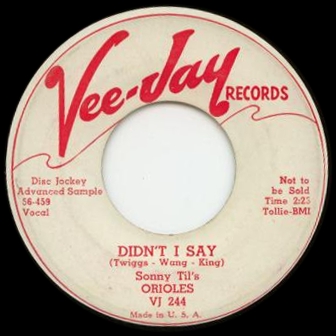
The Orioles: Earlington "Sonny Til" Tilghman (lead); Aaron Cornelius (tenor); Jerry Rodriguez (tenor/ baritone); Albert "Diz" Russell (baritone); Billy Adams (baritone) with prob. Al Smith (ldr); Red Holloway (ts except -1); prob. Lucius "Little Wash" Washington (ts except -1); McKinley Easton (bars except -1); Paul Griffin (p); Lefty Bates (eg); prob. Quinn Wilson (b); Al Duncan (d).
Boulevard Studios, Chicago, mid-May 1956
| 56-458 | Happy 'till the Letter (C. Sewell) -1 | Vee-Jay 196, Oldies 45 OL110 | |
| 56-459 | Didn't I Say (Twiggs-Wang-King)* | Vee-Jay 244*, Abner 1016 | |
| 56-460 | I Just Got Lucky (A. Russell) -1 | Vee-Jay 196 | |
| 56-461 | Sugar Girl (Twiggs-Wang)* -1 | Vee-Jay 244*, Abner 1016 |
After a string of hits for Jerry Blaine's Jubilee label, which was run out of New York City, the original Orioles broke up in 1954. Sonny Til recruited new singers from another group called the Regals and Vee-Jay gave the reconstituted Orioles a try.
Vee-Jay 196 was a single released in June 1956, according to Ferlingere.
Vee-Jay 244 followed in April 1957 (it actually followed Vee-Jay 228, from the group's October 1956 session). Ewart Abner was telling Cash Box on March 16, 1957 (p. 40) that the Orioles "have a newie" (p. 40). Apparently the Orioles broke up again, so Vee-Jay stopped promoting 244.
There was a second attempt to move the record in early 1959, when Abner 1016 was released. (Thanks to Dr. Robert Stallworth for pointing out that Vee-Jay 244 is mislisted as Vee-Jay 214 in many sources.)
Oldies 45 OL110 was released in 1964, on a Vee-Jay subsidiary. Here the group was identified as "Sonny Till and his Orioles" and the title was spelled without an apostrophe, "Happy till the Letter."
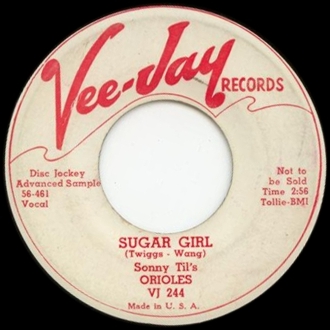
The personnel of the 1956 Orioles comes from Robert Pruter, Doowop: The Chicago Scene. "Sugar Girl" is backed by rhythm section only; in fact, the piano does not accompany the spoken introduction. The prominent bass part in the introduction is definitely not by Al Smith. The pianist does not sound like one of Al's regulars. The tenor saxophonist sounds like Lucius Washington on "I Just Got Lucky"; he takes a nice solo, complete with obbligato from Mac Easton's baritone sax.
However, we have pictorial evidence for this one (and there is very little for Al Smith-led sessions). A photograph from the Scotty Piper collection of the Chicago Historical Society (reproduced in Doowop: The Chicago Scene, after p. 70) shows the Orioles recording for Vee-Jay at Boulevard Studios (not Universal). Two of the Orioles are wearing short-sleeved shirts in this photo, as well as the second photo from the session, which we have reproduced above. The short sleeves make the second Orioles session date (in October) rather unlikely. (Thanks for Stephen Dikovics for pointing this out.) Visible in the first photo are Lefty Bates on guitar and Paul Griffin on piano (Griffin was the Orioles' regular pianist; he was identified from this photo by Diz Russell—thanks to Marv Goldberg for checking this matter out for us). The drummer is not identifiable from the photo (as only his left hand is visible) and the horn players are out of the picture. The bassist is seen from the back. The second photo, as can be seen above, shows Red Holloway on tenor sax and Mac Easton as well as Paul Griffin; thanks to Daniel Gugolz for pointing us to this one.
Matrix numbers and early release history for this session are from Robert Ferlingere, A Discography of Rhythm & Blues and Rock 'n Roll Vocal Groups, Vol. 2 (2nd ed., 1992). MFD give no personnel for this session but indicate that Al Smith is thought to have led the band.
With the next session, a celebrated one by The Dells, Lucius Washington became a regular member of Al Smith's recording groups at Vee-Jay. Since virtually nothing has been written on Lucius Washington, we would like to provide a brief biography of this overlooked musician.
Lucius Washington was born in Memphis, Tennessee, on June 18, 1926. He was inspired to buy a guitar after seeing Tommy Dunlap playing electric guitar (around 1940) with Phineas Newborn Sr.'s group, but the tenor saxophone turned out to be his instrument (he has also played a bit of chromatic harmonica). In 1942, frustrated by the lack of music schools in Memphis, Washington moved to Chicago, where he stayed with a cousin and finished high school at Wendell Phillips. He served in the armed forces in 1944-45, then returned to Chicago where he attended Metropolitan School of Music. In 1949, he sought to join Jump Jackson's combo. Jackson was happy with his current tenor player, Epp James, but he offered to promote and book Washington's own group. Washington also worked in a Dallas Bartley-led group with Vernel Fournier on drums (1950). A young drummer named Bugs Cochran spent some time in Washington's group in the early 1950s, before going into military service.
Washington went into Ada's Chicken Shack (5114 South Prairie) with a "battle of the saxes" format that included Grady Johnson (tenor sax), Louis Carpenter (piano), and Walter Perkins (drums); like many a Chicago combo of the period, they used no bass player. The Washington group played Friday through Sunday for nearly two years (Washington's first contract was posted on May 15, 1952; he filed further contracts on November 6 and November 20, and once again on May 7, 1953). On weeknights, Ada's booked leading blues musicians, including Muddy Waters and Memphis Slim (whom Washington had already met back home), but he did not work with them. When Jump Jackson was rushing out the first promotional material on Washington's group and asked for a marquee name, he hastily suggested "Little Wash." "It haunted me all my career," Washington says today; fans kept confusing his outfit with a blues band.
During part of his time at Ada's (roughly from September 1953 through March 1954), Washington would often drop in at the It Club (where the last set began later) and sit in with Willie Jones' group. "We would get our lesson," he recalls.
By April 1954, Little Wash was leading a trio at the Cotton Club (6249 South Cottage Grove). The Defender for April 6 promised "A Million Dollar $$$ Show" with, among others, singers Walter Spriggs and Joan Payne, and two bands: Little Wash and his All Stars and Marshall Thompson's Block Busters. During the fall Washington also led a band for a time at the Victory Club (contract accepted and filed October 7, 1954). Joe Williams sang with Washington's trio in December 1954, shortly before he left town with the Count Basie band; Washington recalls walking the short distance from the Cotton Club to the Trianon Ballroom to meet Basie.
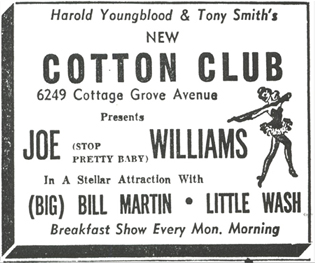
In April 1955 Washington went into the State Theatre Lounge (indefinite contract accepted and filed April 21). Next he led a band at the Crown Propeller Lounge in May 1955 (indefinite contract posted May 5). After about a month at the Crown Propeller, he went into the Stage Lounge for 2 weeks (contract accepted and filed June 16, 1955) and then into the Pit (indefinite contract also posted on June 16; another followed on August 4). He seems to have remained at the Pit through the end of the year (in December, he made two 3-day appearances at the Strand Show Lounge; contracts posted on December 15).
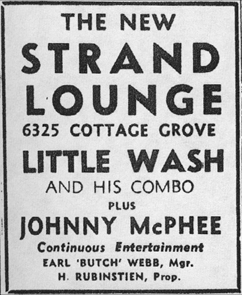
At the beginning of 1956, Washington played another 6 days at the Strand (contract accepted and filed on January 5). On February 2 he posted an indefinite conract with the Picture Lounge. On May 3 his contract for 5 weeks at Club Laurel was accepted and filed. In July he was at the Rock Lounge (indefinite contract accepted and filed on July 19); in August at the Driftwood Lounge (indefinite contract filed August 2). In October Wasington was at Club Reunion (indefinite contract posted October 18).
Washington had been on the scene for 7 years without doing any recording (except on the El Rays' session for Chess, where he was of course uncredited). He got a break when Al Smith, who had been heavily reliant on Red Holloway for tenor sax work, was reportedly looking for a "new sound" on some of his studio sessions, and Lefty Bates recommended him. He appeared on a slew of studio sessions from 1956 through 1958. From 1957 to 1959, Lucius Washington was a regular at McKie's Disc Jockey Lounge, in a battle of the saxes format with Tom Archia; McKie Fitzhugh regularly broadcast parts of the proceedings on his radio show. In the early 1960s, Lucius Washington worked a few Al Smith-led shows with Jimmy Reed as the main attraction. From 1968 to 1970, Washington worked the Monday night jam session at the Pershing Lounge with John Watson on trombone, Bobby Blevins on organ, and Joe Williams (not related to the singer) on drums. He also cut a local LP in 1969 under the leadership of drummer Billy Mitchell; the other band members were Willie Pickens, piano; Walter Hopper, bass; George Freeman, guitar; and Congo Lynn, conga. The combo tried to be the first to put out an instrumental of "Oh Happy Day," a gospel number that enjoyed enormous popularity at the time. In the early 1970s, Washington did a tour of Canada with a latter-day Ink Spots group (again, Lefty Bates was involved); he worked for 3 years during the 1970s with Red Saunders' small group and can be seen in a photo of Red's big band. Lucius Washington's last regular gig was at the Downtown Marriott Hotel in Chicago, in a trio led by pianist Laura Hoffman; Jimmy Willis was the regular bassist for most of the group's run, which went from 1989 through 1999. When the hotel cut back to just Hoffman playing solo piano, Lucius Washington retired, though he still plays an occasional dance.
Our source is Robert Campbell's telephone interview with Lucius Washington, July 18, 2001, with the help of the Board minutes of Local 208, American Federation of Musicians.
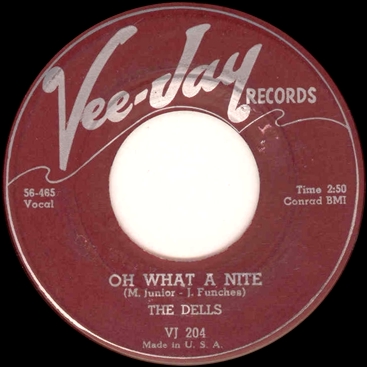
The Dells: Marvin Junior, Verne Allison, Mickey McGill, Johnny Funches, Chuck Barksdale (voc); acc. by Al Smith and his Orchestra: Al Smith (ldr); Lucius "Little Wash" Washington (ts); McKinley Easton (bars); Turk Kincheloe (p); Lefty Bates (eg); Quinn Wilson (b); Paul Gusman (d).
Universal Recording, Chicago, May 21, 1956
| 56-465 | Oh What a Nite (M. Junior - J. Funches) | Vee-Jay 204, Vee-Jay 338, Vee-Jay VJLP 1010, Vee-Jay VJLP 1021, Upfront LP 103, Solid Smoke LP 8029, Charly CRB 1056, Vee-Jay NVD2-701, Famous Groove FG.971001 [CD], Black Tulip 2636302 [CD], Collectables CD 7204, Collectables CD 7246 | |
| 56-466 | Now I Pray | Solid Smoke LP 8029, Charly CRB 1055, Vee-Jay NVD2-701, Black Tulip 2636302 [CD], Collectables CD 7246 | |
| 56-467 | Jo-Jo (T. Twiggs - C. Carter) | Vee-Jay 204, Vee-Jay VJLP 1021, Charly CRB 1056, Vee-Jay NVD2-701, Famous Groove FG 971010 [CD], Black Tulip 2636302 [CD], Collectables CD 7246 | |
| 56-468 | Baby Do | Charly CRB 1056, Vee-Jay NVD2-701, Black Tulip 2636302 [CD] |
Session Information from the MFD Files. Vee-Jay 204 was a single released in August 1956, according to Ferlingere; Vee-Jay 338 came out in December 1959. Charly CRB 1055 From Streetcorner to Soul and Charly CRB 1056 Rockin' on Bandstand are two LP compilations of Dells recordings for Vee-Jay. They were released in 1985. Famous Groove Famous Groove FG 971001 , Vee-Jay Doo Wop Volume 1: Oh What a Nite was released in 1997. Famous Groove FG 971010, Vee-Jay Doo Wop Volume 3: A Long Time Ago, was also released in 1997. "Baby Do" is listed as "Baby Doo" on the Black Tulip bootleg. Collectables CD 7204, Vee-Jay Rhythm & Blues: The Early Years, Part One is a 2000 release, as is CD 7246, The Very Best of the Dells.
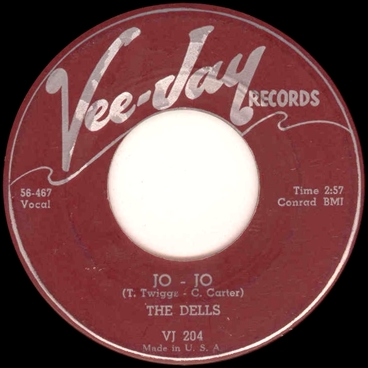
"Oh What a Nite" isn't just a classic doo-wop; it also contains a classic solo by Little Wash. There are breaks for Lefty Bates on "Now I Pray." "Jo-Jo" and "Baby Do" feature what are essentially duos between Little Wash and Mac Easton. On listening to this session, Vernel Fournier thought he was on it until he heard "Baby Do," which includes fills that he didn't use. Presumably the MFD files are right in pointing to Paul Gusman! Fournier also said that Turk Kincheloe, who wasn't usually tapped for these outings, was a jazz pianist. Stuart "Turk" Kincheloe had recorded for Vee-Jay in 1954 with his own jazz quartet and would make a second appearance for the label in July as a membo of a combo led by Duke Groner. In the early 1960s, Kincheloe accompanied the Dells under his new stage name, Kirk Stuart.
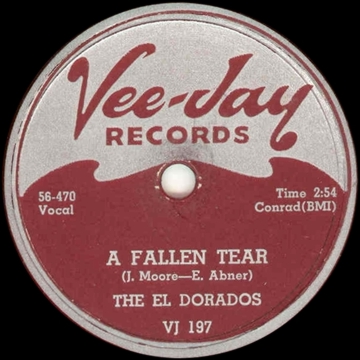
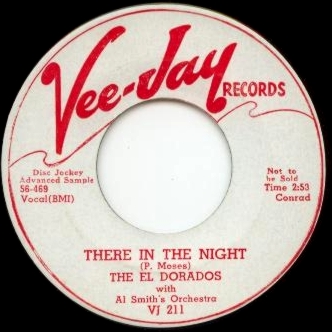
The El Dorados: Pirkle Lee Moses, Jewel Jones, Louis Bradley, James Maddox (voc) acc. by Al Smith Orchestra: Al Smith (ldr); Lucius Washington (ts); McKinley Easton (bars); Horace Palm (celeste -1; p); Lefty Bates (eg); prob. Quinn Wilson (b); prob. Paul Gusman (d).
Universal Recording, Chicago, May 22, 1956
| 56-469 | There in the Night (P. Moses)* | Vee-Jay 211, Vee-Jay VJLP 1001, Solid Smoke LP 8025, Vee-Jay NVD2-702, Collectables CD 7245 | |
| 56-470 | A Fallen Tear (J. Moore - E. Abner) | Vee-Jay 197, Vee-Jay VJLP 1001, Solid Smoke LP 8025, Charly LP 1022, Vee-Jay NVD2-702, Collectables CD 7245 | |
| 56-471 | Chop Ling Soon (L. Bradley-J. Moore-E. Abner) | Vee-Jay 197, Charly LP 1022, Vee-Jay NVD2-702, Collectables CD 7245 | |
| 56-472 | Make Me a Sweetie | unissued |
Our session information comes from the MFD Files, except that Paul Gusman was identified by ear.
Vee-Jay 197 was a single released in June 1956; Vee-Jay 211 came out in September of the same year, according to Ferlingere. Collectables CD 7245 is a 2000 release titled The Very Best of the El Dorados.
"A Fallen Tear" features the dual lead of Bradley and Maddox; "Chop Ling Soon" features Moses as lead. Horace Palm plays celeste during the monologue on "There in the Night"; Little Wash accompanies the vocals. "A Fallen Tear" includes no instrumental solos.
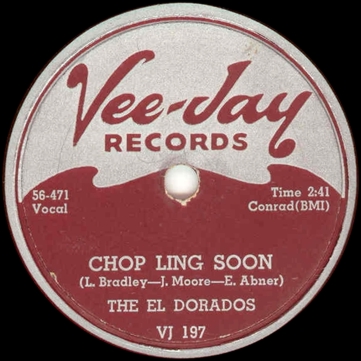
The labels on Vee-Jay 243, one side of which came from a session in early July 1956 by the Delegates, say that accompaniment was provided by Al Smith's Orchestra. The 1956 session, done when the group was still called the Kool Gents, spanned matrix numbers 56-491 through 494. According to the MFD Files, however, "I'm Gonna Be Glad" (issued on Vee-Jay 243) and the other tracks from this session did not, in fact, use an Al Smith-led group. The other side of Vee-Jay 243 came from a session in February 1957 that Smith and company really did participate in (see below).
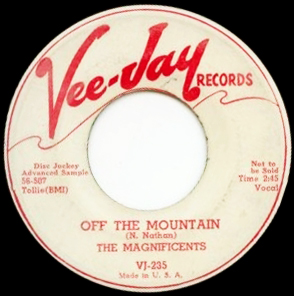
Barbara Arrington, Johnny Keyes, L. C. Cooke, Fred Rakestraw, Willie Myles (voc); Al Smith (ldr); unidentified (ts); unidentified (bars); unidentified (p); prob. Quinn Wilson (b); prob. Vernel Fournier (d).
Boulevard Studios, Chicago, late July, 1956
| 56-507 | Off the Mountain (N. Nathan) | Vee-Jay 235, Solid Smoke LP 8030, P-Vine Special [J] 1412 [CD], Collectables CD 7205 | |
| 56-507 [alt.] | Off the Mountain [alt.] | Vee-Jay NVD2-715, Famous Groove FG 971002 [CD] | |
| 56-508 | Caddy Bo (N. Nathan) | Vee-Jay 208, VJLP 1001, Vee-Jay NVD2-709, Famous Groove FG 971010 [CD] | |
| 56-509 | Hiccup | Vee-Jay 208, P-Vine Special [J] 1412 [CD] | |
| 56-509 [alt.] | Hiccup [alt.] | Vee-Jay NVD2-715 | |
| 56-510 | This Ole Love of Mine | Solid Smoke LP 8030, Vee-Jay NDV2-715, Famous Groove FG 971011 [CD] |
All four of these tracks were first recorded, in a different order, on July 13, 1956 (matrix numbers 56-495 through 56-498). They were done with a different band featuring neither Smith nor Lefty Bates, and the first attempts were rejected. Obviously the remake session didn't take place the same day, but the date of 56-507 through 510 has also been given as July 13 in some sources. The vocal lineup and titles are from Pruter's book. August 1956 was the release date for Vee-Jay 208; Vee-Jay 235 came out in January 1957, according to Ferlingere.
The MFD Files give little help with the personnel on this date. A listen to the session suggests the lineup listed above. There are no instrumental solos on any of the numbers, which makes identifications difficult. There are some upper-register passages from the tenor sax on "Hiccup" that seem to rule out both Red Holloway and Lucius Washington, and the prominent baritone sax part on the same piece is definitely not by Mac Easton. Barbara Arrington has the vocal lead on all numbers except "Off the Mountain."
Solid Smoke LP 8030 was a collection released in 1984. Vee-Jay CD 709, A Taste of Doo Wop Volume 1, appeared in 1993. Vee-Jay CD 715, A Taste of Doo Wop Volume 2 appreared that same year. Famous Groove FG 971002 is a French compilation called Vee-Jay Doo Wop Volume 2: Bim Bam Boom! It was released in 1997. Famous Groove FG 971011 is another French compilation titled Vee Jay Doo Wop Volume 4: Flippity Flop; it was also released in 1997. Collectables CD 7205, Vee-Jay Rhythm & Blues: The Early Years, Part Two, is a 2000 release. We are not sure which take of "Off the Mountain" was included in this compilation.
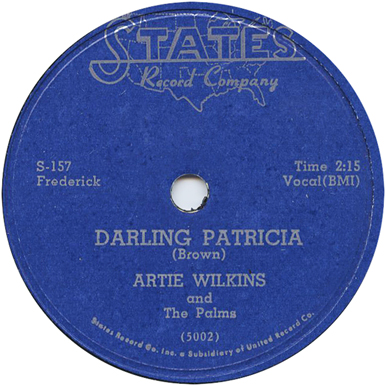
Artie Wilkins (voc); The Palms: Wilbur Williams (lead); Willie Young (tenor); Murrie Eskridge (1st tenor); O. C. Perkins (2nd tenor); M. C. Ward (bass); with Al Smith (ldr); Lucius Washington (ts); McKinley Easton (bars); unidentified (eg); Horace Palm (p); Quinn Wilson (b); Vernel Fournier (d).
Boulevard Studios, Chicago, July 27, 1956
| 5001 | Darling Patricia$ (Brown) [AW, P voc] | States 157, United U-163 [CD] | |
| 5002-2 | Please Come Back^ (Binder) [AW voc] | States 157, P-Vine Special [J] PLP-9045, United U-163 [CD] | |
| 5003-3 | Traveling Blues [AW voc] | P-Vine Special [J] PLP-9045 | |
| 5004-4 | Going Home to My Baby [AW voc] | P-Vine Special [J] PLP-9045 | |
| 5005 | I Knew I Had a Chance [P voc] | Delmark DE-703 [CD] | |
| 5006 | Dianne [P voc] | Delmark DE-703 [CD] |
Session information from Koester's discography. We got the take numbers from P-Vine Special PLP-9045, Black Music in the 50's Volume 13: Standup and Sing the Blues, which was released in Japan in 1982.
United U-163 is a 1999 bootleg CD titled Rare Windy City R&B Vocal Groups From the street-corners of Chicago Volume One. The liners to this CD give 5001 as the matrix for "Please Come Back" and 5002 for "Darling Patricia."
Our personnel for the Palms comes from Robert Pruter's liner notes to Delmark DE-703. We previously listed a trumpet player on the session, and left the guitarist off, but no trumpet can be heard on either 5001 or 5002, while the guitarist is quite noticeable. There is a tenor-baritone sax duo on "I Knew I Had a Chance." "Please Come Home" has a solo by Little Wash, with prominent accompaniment by Mac Easton, as does "Darling Patricia."
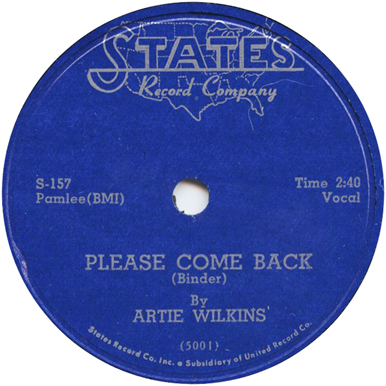
Although we don't know the exact circumstances, the Artie Wilkins session involved some kind of collaboration between Leonard Allen and two other players in the music business in Chicago. Joe Brown, best known as the proprietor of JOB, was listed as the composer on "Darling Patricia." Frederick Music, owned by Vincent "Bud" Brandom, was the publisher; later in 1956 Brandom bought half of Pamlee, the United/States house publisher, and in 1977 would acquire the other half from Leonard Allen.
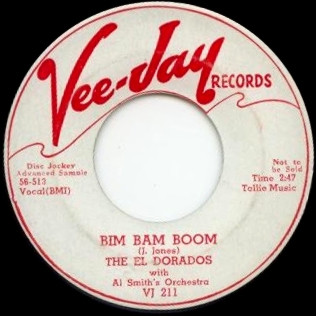
The El Dorados: Pirkle Lee Moses, Jewel Jones, Louis Bradley, James Maddox (voc) acc. by Al Smith Orchestra: Al Smith (ldr); Sonny Cohn (tp); Red Holloway (ts); McKinley Easton (bars); Horace Palm (p); Lefty Bates (eg); prob. Quinn Wilson (b); Paul Gusman (d).
Universal Recording, Chicago, August 8, 1956
| 56-513 | Bim Bam Boom (J. Jones) | Vee-Jay 211, Solid Smoke LP 8025, Charly LP 1022, Vee-Jay NVD2-702, Famous Groove FG.971002 [CD], Collectables CD 7204, Collectables CD 7245 | |
| 56-513 [alt.] | Bim Bam Boom [alt.] | Famous Groove FG.971002 [CD] |
Information from the MFD Files. Vee-Jay 211 was a single released in September 1956. Famous Groove FG.971002 is a French compilation called Vee-Jay Doo Wop Volume 2: Bim Bam Boom! It was released in 1997. Collectables CD 7204, Vee-Jay Rhythm & Blues: The Early Years, Part One is a compilation released in 2000; we are assuming that it used the originally issued take of "Bim Bam Boom." Collectables CD 7245, The Very Best of the El Dorados, was also issued in 2000; the same question applies to it.
The alternate take of "Bim Bam Boom" features a tenor solo by Red Holloway; some muted trumpet by Sonny Cohn in the coda; and hand claps (probably by the El Dorados) during the opening vocal.
The two matrix numbers in between these sessions are 56-514 and 515. These belong, respectively, to "Supernatural Love" and "Wait a Minute," by singer Jo Ann Raven with an uncredited vocal group; the sides were released on the highly obscure Vee-Jay 217. The single is so obscure that we didn't hear it until October 2018. Now we can say that the band is the same as on on the August 8 and the August 21 sessions. The best argument for putting it with the August 8 sides is that otherwise there were only two; if Vee-Jay 217 belongs, the vocal group was the El Dorados.
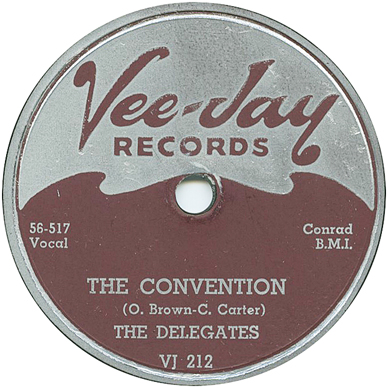
The Delegates [the Kool Gents]: John McCall, Doug Brown, Delecta "Dee" Clark, Teddy Long, Johnny Carter (voc -1); Oscar Brown, Jr. (speech -1); Calvin Carter (speech -1); with Al Smith (ldr); Sonny Cohn (tp); Red Holloway (ts); McKinley Easton (bars); Horace Palm (p); prob. Quinn Wilson (b); Lefty Bates (eg); Paul Gusman (d).
Universal Recording, Chicago, August 21, 1956
| 56-516 | Red's Wailin' ^ | Vee-Jay (unissued) | |
| 56-517 | The Convention (Oscar Brown, Jr. - C. Carter) -1 | Vee-Jay 212, Charly LP 1010, Famous Groove FG 971011 [CD] | |
| 56-518 | instrumental* | Vee-Jay (unissued) |
Our session information comes from the MFD Files; the Vee-Jay Master Book indicates that the never issued 56-516 and 518 were instrumentals by the Al Smith group, and that the first of them featured Red Holloway. Vee-Jay 212 was a single released in September 1956, according to Ferlingere; the flip side was an instrumental by Big Jay McNeely. Charly LP 1010 was a Dee Clark collection, released in 1980 under the title Keep It Up.
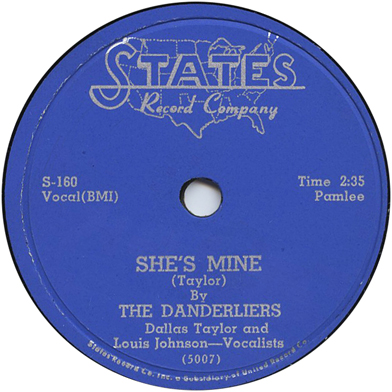
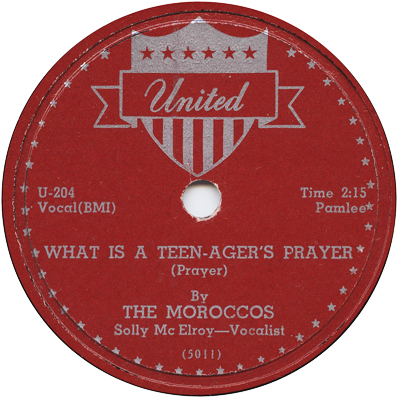
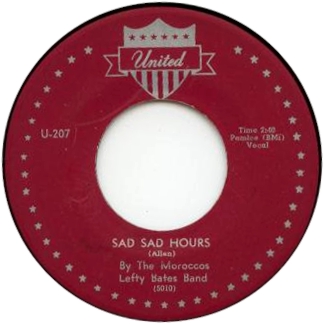
The Danderliers: Dallas Taylor (tenor and lead); James Campbell (tenor and lead); Bernard Dixon (tenor); Walter Stephenson (baritone); Louis Johnson (bass); ; The Moroccos: Sollie McElroy (lead); Ralph Vernon (tenor); Melvin Morrow (tenor); Calvin Barron (baritone); Fred Martin (bass); with Lefty Bates (eg, ldr); Lucius Washington (ts); McKinley Easton (bars); unidentified (p); poss. Al Smith (b); prob. Paul Gusman (d).
Boulevard Studios, Chicago, prob. late August 1956
| 5007 | She's Mine (Taylor) [D voc] | States 160, Delmark DE-703 | |
| 5008 | My Love (Morrow) [D voc] | States 160, Delmark DE-703 | |
| 5009-5 | Bang Goes My Heart (Prayer) [M voc] | United 204, United U-143 [CD], Delmark DE-761 [CD] | |
| 5010-4 | Sad Sad Hours (Allen) [M voc] | United 207, United U-143 [CD], Delmark DE-761 [CD] | |
| 5011-2 | What Is a Teen-Ager's Prayer (Prayer) [M voc] | United 204, United U-143 [CD], Delmark DE-761 [CD] | |
| 5012-2 | The Hex (Allen) [M voc] | United 207, United U-143 [CD], Delmark DE-761 [CD] |
Our session information comes from Koester's discography of the United and States labels, with corrections by Bob Pruter. Matrix number 5013, "My Love," is listed by Koester but appears to be a phantom. The session number from Boulevard was 42-463. Since the July 27 session was 42-443 and the January 7 session was 42-318, extrapolation gives us a late August date (however, United U-143 gives July 1956 as the date instead). United 204 was released in September 1956. All instrumentalists were identified by ear from the Danderliers and Moroccos sides. "Bang Goes My Heart" features a solo by Lefty Bates; "Sad Sad Hours" and "Teenager's Prayer" have no solos, though the tenor sax line on "Sad Sad" sounds like Little Wash; Little Wash finally gets a solo on "The Hex," with accompaniment by Mac Easton. The drummer does a little Latin percussion on the intro to "The Hex." "Sad Sad Hours" was actually written by George Prayer, a former member of the Moroccos.
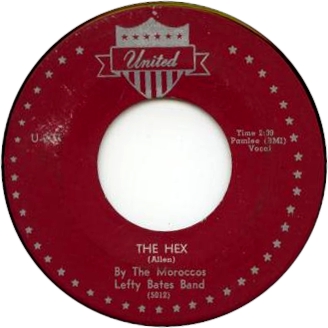
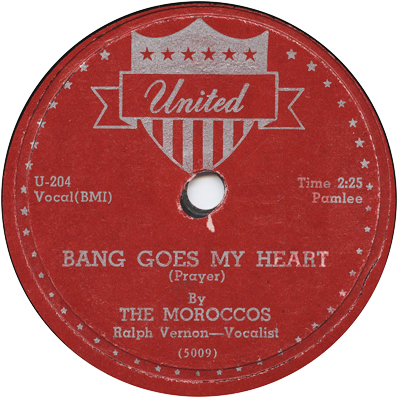
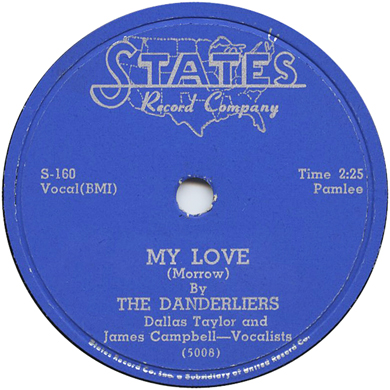
United CD U-143 is a bootleg issue from 1999 titled Rare Windy City R&B Vocal Groups From the street-corners of Chicago Volume Two.
United and States, which were on their last legs by this time, would do three more doo-wop sessions. The February 26, 1957 session with The Palms used a group led by Lefty Bates with tenor sax, guitar, bass, and drums. On April 5, 1957, there was a session with The Palms, The Strollers, and The Answers. This session used a Lefty Bates group including Red Holloway on tenor sax and Mac Easton on baritone, an unidentified pianist, a flatteringly recorded bassist who is way too good to be Al Smith, and probably Paul Gusman on drums. The last session for States, on July 12, 1957, was split between blues singer Arbee Stidham and an obscure vocal group called The Earls; it featured a combo led by Lefty Bates, but since we have learned that Al Smith played bass on it, we will pick it up below.

The Dells: Marvin Junior, Verne Allison, Mickey McGill, Johnny Funches, Chuck Barksdale (voc) acc. by Al Smith and his Orchestra: Al Smith (ldr); James "Red" Holloway (ts); McKinley Easton (bars); Horace Palm (p); Lefty Bates (eg); prob. Quinn Wilson (b); Paul Gusman (d).
Universal Recording, Chicago, September 5, 1956
| 56-543 | It Takes Time | unissued | |
| 56-544 | I Wanna Go Home (M. Junior) | Vee-Jay 230, Vee-Jay 338*, Vee-Jay VJLP 1010, Charly CRB 1056, Vee-Jay NVD2-701, Black Tulip 2636302 [CD], Collectables CD 7246 | |
| 56-545 | When You Kiss Me | unissued | |
| 56-546 | Movin' On (V. Allison) | Vee-Jay 230, Vee-Jay VJLP 1010, Famous Groove FG.971002 [CD], Black Tulip 2636302 [CD], Collectables CD 7246 |
Sesssion information from the MFD Files. Vee-Jay 230 was a single released in December 1956; Vee-Jay 338 followed in December 1959, according to Ferlingere. Charly CRB 1056 Rockin' on Bandstand is a compilation of Dells recordings for Vee-Jay. It was released in 1985. Famous Groove FG 971002 is a French compilation called Vee-Jay Doo Wop Volume 2: Bim Bam Boom! It was released in 1997. The Black Tulip bootleg, The Dells: Oh What a Night has the final track as "Movin' On." So does The Very Best of the Dells on Collectables CD 7246, a 2000 release.
On the two released cuts, which are moving on toward soul music, there are no instrumental solos.


The Orioles: Earlington "Sonny Til" Tilghman (lead); Aaron Cornelius (tenor); Jerry Rodriguez (tenor/baritone); Albert Russell (baritone); Billy Adams (baritone) with Al Smith (ldr); Lucius "Little Wash" Washington (ts); unidentified (ts); McKinley Easton (bars); prob. Paul Griffin (p -1, org -2); prob. Quinn Wilson (b); Lefty Bates (eg); Al Duncan (d).
prob. Universal Recording, Chicago, October, 1956
| 56-567 | Fools Will Be Fools | unissued | |
| 56-568 | Live It Up | Vee-Jay VJLP 1021 | |
| 56-569 | For All We Know (Coots-Lewis) -1 | Vee-Jay 228, Famous Groove [Fr] FG. 971010 [CD] | |
| 56-570 | Never Leave Me Baby (I. Hunter) -2 | Vee-Jay 228, Famous Groove [Fr] FG. 971011 [CD] |
Vee-Jay 228 was a single released in November 1956, according to Ferlingere. Pruter states in Doowop: The Chicago Scene that The Orioles cut eight sides for Vee-Jay and released six of them on singles. Our information on 56-567 and 568 is drawn from the Vee-Jay Master Book; the title of 568 has been misrendered in some sources as "Give It Up."
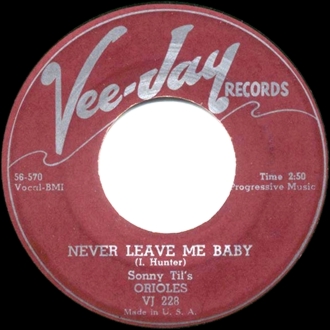
Vocal personnel were identified by Robert Pruter. Since Paul Griffin was the Orioles' regular pianist at the time, he is the obvious candidate for keyboardist here. "Never Leave Me" also has a tenor sax solo by Little Wash.


The Spaniels: James "Pookie" Hudson, Carl Rainge, Don Porter, James "Dimples" Cochran, Gerald Gregory (voc) with Al Smith and his Orchestra: Al Smith (ldr); Lucius Washington (ts); McKinley Easton (bars except -1); Horace Palm (p); Lefty Bates (eg); prob. Quinn Wilson (b); Al Duncan (d).
Universal Recording, Chicago, November 5, 1956
| 56-571 | Please Don't Tease (Blackwell) | Vee-Jay 229, Vee-Jay LP 1002, Lost Nite LP 137, Charly LP 1114, Charly CD 222, Vee-Jay NVD2-704, Collectables CD 7244 | |
| 56-572 | Jessie Mae (Hudson) | Solid Smoke LP 8028, Charly CD 222, Vee-Jay NVD2-714, Collectables CD 7243 | |
| 56-573 | I Need Your Kisses (C. Carter-J. Hudson)* | Vee-Jay 257, Vee-Jay LP 1002, Charly LP 1021, Charly CD 222, Vee-Jay NVD2-704, Collectables CD 7244 | |
| 56-574 | You Gave Me Peace of Mind (Bracken) -1 | Vee-Jay 229, Vee-Jay LP 1002, Upfront LP 131, Lost Nite LP 137, Charly LP 1021, Solid Smoke LP 8028, Charly CD 222, Vee-Jay NVD2-704, Collectables CD 7205, Collectables CD 7243 |
Session information from the MFD Files. However, MFD wrongly abbreviate the title of 56-574 to "Peace of Mind." Vee-Jay 229 was part of a "special Thanksgiving package" of releases (Cash Box, November 24, 1956, p. 32). The single was reviewed in Cash Box on December 22 (p. 38), pushed again in the year-end ad on December 29 (p. 41), and given solo ads on January 5 (p. 23) and January 12, 1957 (p. 34). Vee-Jay 229 was mentioned in a group ad on January 19, 1957 (Cash Box, p. 40) and again on February 2 (Cash Box, p. 41).
Vee-Jay 257 was being talked up by Ewart Abner in August 1957 (Cash Box, August 13, 1957, p. 40) and was released in September; it was reviewed in Cash Box on October 5, 1957 (p. 60) and given a solo advertisement there on October 12, 1957 (p 45).
Upfront LP 131 was titled Hits of the Spaniels, released in 1970. Solid Smoke LP 8028 was released as 16 Soulful Serenades in 1984. Charly LP 1114 was released as Stormy Weather in 1985. Collectables CD 7205, Vee-Jay Rhythm & Blues: The Early Years Part Two, Collectables CD 7243, The Very Best of the Spaniels Part 1, and Collectables CD 7244, The Very Best of the Spaniels Part 2 were all released in 2000.
The Spaniels' lineup as of this date is taken from Doowop: The Chicago Scene. Lucius Washington gets a tenor sax solo on "Please Don't Tease" and a longer one on "I Need Your Kisses." He takes a ballad solo on "You Gave Me Peace of Mind," where Mac Easton sits out. "Jessie Mae" has no instrumental solos.

In 1957 Al Smith continued to be indispensable, cutting 11 sessions for Vee-Jay. (He also appeared on the last session for the faltering States label in July.) Vee-Jay produced around 220 sides that year; Al was partly responsible for more than 1/5 of them. When Vee-Jay started the Falcon label (name later changed to Abner) room was made for instrumental sides by the Al Smith combo. Smith also picked up a freelance session when Duke Records made one of its sporadic expeditions to Chicago. The Al Smith band was adapting well to the advent of rock and roll and soul music, but there was some loss of solo opportunities for the musicians as the new styles consolidated. And Vernel Fournier was now working five days a week with the Ahmad Jamal Trio, so he was no longer available for these sessions.
Smith had also quit doing club gigs; his live appearances were now limited to leading the band for package shows.
Vee-Jay was busy in the studio during the first month of 1957. "Vee-Jay's session sked reads like an all-star presentation show. Jimmy Reed, The Spaniels, The Dells, Al Smith's Ork, Ron Wiggins, and El Dorados all cut cut this week" (Cash Box, January 19, 1957, p. 38). We include here only the items that we know an Al Smith band worked on: those explicitly credited to Smith, of course, and those by the Dells.
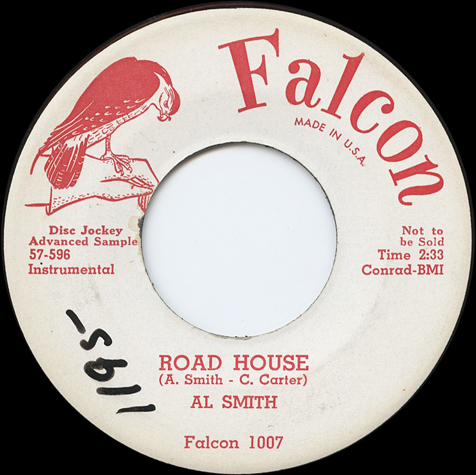
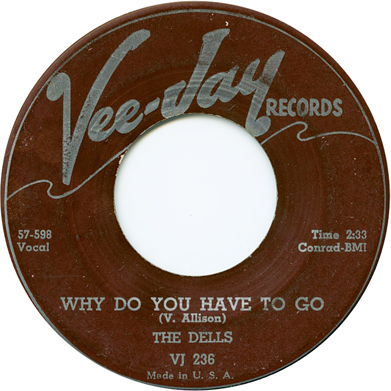
The Dells: Marvin Junior, Verne Allison, Mickey McGill, Johnny Funches, Chuck Barksdale (voc -1) with Al Smith and his Orchestra: Al Smith (ldr); Harlan "Booby" Floyd (tb on %); Lucius Washington [Little Wash] (ts; hca on %); McKinley Easton (bars); Horace Palm (p); Lefty Bates (eg); prob. Quinn Wilson (b); Al Duncan (d).
Universal Recording, Chicago, January 11, 1957
| 57-594 | One, Two, Cha Cha Cha (C. Jones-R. Hampton)^ [D voc?] | Falcon 1001, Abner 1020 | |
| 57-595 | Get Up and Go (A. Smith)^% | Falcon 1001 | |
| 57-596 | Road House (A. Smith-C. Carter)^ | Falcon 1007 | |
| 57-597 | Soft and Easy^ | unissued | |
| 57-598 | Why Do You Have to Go (V. Allison)* -1 | Vee-Jay 236, Vee-Jay VJLP 1010, Solid Smoke LP 8029, Charly CRB 1055, Vee-Jay NVD2-701, Black Tulip 2636302 [CD] | |
| 57-599 | A Distant Love (V. Allison) -1 | Vee-Jay 251, Black Tulip 2636302 [CD] | |
| 57-600 | Dance, Dance, Dance (V. Allison)* -1 | Vee-Jay 236, Vee-Jay VJLP 1010, Charly CRB 1056, Black Tulip 2636302 [CD] | |
| 57-601 | Pain in My Heart (Junior-Funches) -1 | Vee-Jay 258, Vee-Jay VJLP 1010, Solid Smoke LP 8029, Vee-Jay NVD2-701, Black Tulip 2636302 [CD] | |
| 57-602 | You Know -1 | unissued |
Our basic session information on the instrumentals is from Jepsen, except that Jepsen has Leon Washington in place of Lucius on tenor sax. The MFD Files put Lucius Washington on the instrumentals and the numbers with The Dells. MFD have Harlan "Booby" Floyd on trombone for the numbers by The Dells, but no trombone is audible on any of these, nor can Floyd be heard on "Road House" or "One, Two, Cha Cha Cha." He does appear on "Get Up and Go," however. No previous source caught the two harmonica solos on "Get Up and Go"; Lucius Washington also played the instrument. Riley Hampton is listed as a composer on "One Two, Cha Cha Cha" (Jepsen, unrhythmically, leaves off the last "Cha") but his alto sax is not present on the track.
Vee-Jay 236 was a single released in February 1957. Cash Box carried an ad for it on February 23 (p. 39). On March 2, 1957 (p. 38), Ewart Abner was talkng up the audience response to "Why Do You" at the Dells' appearances in Georgia and Florida. The Cash Box review arrived on March 9, 1957 (p. 43), and the single was advertised on March 16 (p. 40). Further ads followed on April 13 (p. 43) and May 4, 1957 (p. 41).
Vee-Jay 251 came out in June 1957, according to Ferlingere. The flip was from a session cut on June 13, 1957, without Al Smith. Vee-Jay was anxious to get it on sale and had copies out to DJs before the month ended.
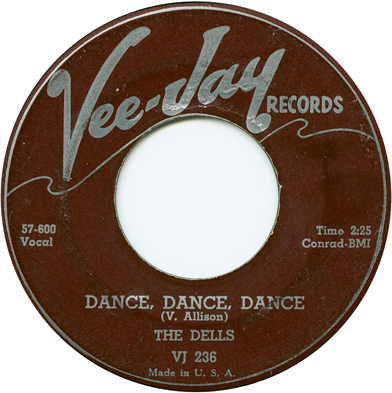
Also according to Robert Ferlingere, Vee-Jay 258 was ready for release in August; delta numbers on copies pressed at Monarch Record Pressing Plant in Los Angeles nail down the date. But the company held it back, trying not to step on the sales of something else that was hot. Vee-Jay 258 was reviewed in Cash Box on November 9, 1957 (p. 49; it got R&B Sleeper of the Week) and wasn't advertised in Billboard till December. It was still being advertised in Cash Box on January 11, 1958 (p. 36). "Pain in My Heart" was the B side; the A side was 57-706, "Time Makes You Change," from a session later in 1957 with a different band. An Oldies 45 reissue, OL112 from 1964, has "Time Makes You Change" on one side, with a credit to "The Dells w/ Al Smith's Orchestra," but this was a mistake carried over from the labels to Vee-Jay 258.
Charly CRB 1055 From Streetcorner to Soul and Charly CRB 1056 Rockin' on Bandstand are LP compilations of Dells recordings for Vee-Jay. They were released in 1985. As usual, there are slightly variant titles on the Black Tulip CD.
The Falcon label was a Vee-Jay subsidiary that started operations in May 1957; the first ad for Falcon (when Falcon 1000, 1001, and 1002 were all being circulated to Chicago-area radio stations on a trial basis, but just 1002 rated a mention in a company ad) appeared in Cash Box, May 25, 1957, p. 101. Falcon 1001 was thus released on 78 and 45 rpm in May 1957. Ewart Abner was talking the new label up at the MOA convention (Cash Box, June 1, 1957, p. 44); Falcon 1001 drew reviews in Billboard (June 17, 1957, p. 74) and Cash Box (June 29, 1957, p. 50).
Falcon 1007, another release on 78 and 45 rpm, was reviewed in Billboard on December 2, 1957 (p. 60). After Falcon 1013, "For Your Precious Love" by Jerry Butler, was already out and already selling, Ewart Abner discovered an existing Falcon label that operated out of the Rio Grande valley in Mission, Texas. (Or the existing Falcon label discovered Ewart Abner. One of the two.) In June 1958, Vee-Jay abruptly changed the name of the subsidiary. An ad in Cash Box on June 28 went so far as to ask DJs to replace their copies of Falcon 1013 with new copies of Abner 1013; so did stickers attached to some DJ copies of Abner 1013. All subsequent releases were on Abner.
Abner 1020 was a 78 and 45-rpm single, released in October 1958.
There are no instrumental solos on "Why Do You Have to Go." Lefty Bates solos on "A Distant Love"; Little Wash gets some exposure on "Dance, Dance, Dance" and "Pain in My Heart." "Road House" features solos by Lefty Bates and Little Wash. "One Two, Cha, Cha, Cha" features Lefty's guitar again and includes a nice tenor solo by Little Wash. There are background vocalists wordlessly singing a period rock riff on "One, Two"; much smoother than the band's shout of "cha cha cha" that ends the piece, we suspect the Dells arrived early. "Get Up and Go" varies the pattern with two harmonica solos and a trombone solo for Booby Floyd.
Tom Lord's Jazz Discography claims that 57-604, "Someday," came from this session and was released on Falcon 1000 (with a flip by Ron Wiggins). In point of fact, 57-604, "Someday" was by Ron Wiggins, as was the flip to Falcon 1000, 57-605, "Angel Hands." Wiggins' session could have immediately followed the Al Smith/Dells outing, but in any case we don't know who accompanied him.

Herman Parker Jr. (voc) with Al Smith (ldr); unidentified (tp); Red Holloway (ts); unidentified (sax); Lefty Bates (eg); Quinn Wilson (b); Al Duncan (d).
Chicago, January [?] 24, 1957
| UV 3042 | Peaches | Duke 177, Duke LP 83 | |
| UV 3043 | Pretty Little Doll (Scott-Robey) | Duke 177 |
Our information comes from Leadbitter, Fancourt, and Pelletier 1994. MFD confirm Al Smith's involvement in this session but give no personnel or exact date. Duke LP 83 appeared in 1974 and was titled The Best of Junior Parker.

The Delegates [i.e., the Kool Gents]: John McCall, Doug Brown, Delecta "Dee" Clark, Teddy Long, Johnny Carter (voc); with Al Smith (ldr); Red Holloway (ts); McKinley "Mac" Easton (bars); Horace Palm (p); Lefty Bates (eg); Quinn Wilson (b); Al Duncan (d).
Universal Recording, Chicago, February 19, 1957
| 57-622 | Mother's Son (Johnson-Cox) | Vee-Jay 243, Charly LP 1115, Vee-Jay NVD2-703, Famous Groove FG 971010 [CD] | |
| 57-623 | Gloria (Clark)^ | Falcon 1002, Vee-Jay 355, Vee-Jay LP 1019, Vee-Jay NVD2-703, Collectables CD 7265 | |
| 57-624 | June | unissued | |
| 57-625 | Kangaroo Hop (Clark)^ | Falcon 1002, Vee-Jay LP 1019, Vee-Jay NVD2-703, Collectables CD 7265 |
Robert Pruter's Doowop: The Chicago Scene and Gribin and Schiff's tome are again the main sources. Matrix numbers and instrumental personnel from the MFD Files. However, there was definitely a baritone saxophonist on this session—entrusted with some intricate lines on "Mother's Son" and "Gloria." And we hear Red Holloway on tenor sax (soloing on "Kangaroo Hop") but have encountered no sign of Lucius Washington ("June," from this session, has never been released in any form). Mac Easton is a safe bet on the bari.
Vee-Jay 243 was issued in March 1957, according to Ferlingere; the flip was from an earlier Kool Gents session without Al Smith (although Al was incorrectly credited with accompaniment on that side). "Mother's Son" was stolen from the De'bonairs when they auditioned at Vee-Jay. The De'bonairs had released the song on Ping 1000 in November 1956 (see the Ping Discography for details). Vee-Jay 243 was by the Delegates; all subsequent releases have been under Dee Clark's name.
"Gloria" and "Kangaroo Hop" were released on Falcon 1002 in May 1957 as by Dee Clark (he had gone solo by then, breaking up the Kool Gents). We are indebted for Dan Ferone for label copy on Falcon 1002. 1002 was the first release on the new subsidiary to catch a mention in a company ad (Cash Box, May 25, 1957, p. 101). It was reviewed in Billboard on June 17, 1957 (p. 75) and in Cash Box on June 22 (p. 40). "Gloria" was reissued on Vee-Jay 355, a 45 rpm release, in July 1960.
Vee-Jay LP 1019, Dee Clark: You're Looking Good, was issued in 1960. Vee-Jay NVD2-703, Dee Clark: Rain Drops, appeared in 1993. Collectables CD 7265, You're Looking Good/Hold On, is a reissue from 2000 of two of Dee Clark's LPs on Vee-Jay.
Quinn Wilson had a hard act to follow introducing "Mother's Son"; the Ping original was a showcase for Malachi Favors. Wilson was a regular member of the Lefty Bates Trio and the bassist Al Smith usually turned to when he wasn't playing the instrument himself. (Wilson also participated in a number of non-Al sessions for Vee-Jay, under the leadership of Lefty Bates or Red Holloway). Wilson was a storied veteran of the Chicago scene. He was born in Chicago on December 26, 1908 and played his first professional gig (on sousaphone) in 1925. He recorded with Jelly Roll Morton's Red Hot Peppers for Victor in 1927. He joined Earl Hines' big band and was a regular for many years, making the inevitable switch from sousaphone to string bass in the early 1930s. He still played the sousaphone in parades, however. (See the brief interview that Don Hill conducted with Wilson in 1958; it was not published until April 1987, in Cadence magazine, p. 16).
On March 7, 1957, Al Smith, now winding down his activities in the clubs, posted a contract for an indefinite period of time with the Driftwood Lounge. This would be his last appearance on the Local 208 contract list.
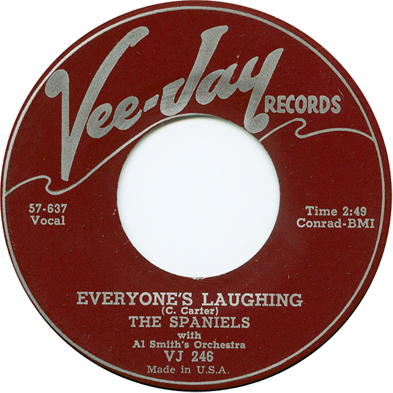
The Spaniels: James "Pookie" Hudson, Carl Rainge, Don Porter, James "Dimples" Cochran, Gerald Gregory (voc) with Al Smith and his Orchestra: Al Smith (ldr); Lucius Washington (ts except -1); McKinley Easton (bars except -2); Horace Palm (p); Lefty Bates (eg); prob. Quinn Wilson (b); Al Duncan (d, Latin perc).
Universal Recording, Chicago, March 12, 1957
| 57-637 | Everyone's Laughing (C. Carter) -2 | Vee-Jay 246, Vee-Jay VJLP 1024, Lost Nite LP 137, Solid Smoke LP 8028, Charly CD 222, Vee-Jay NVD2-714, Famous Groove FG. 971002 [CD], Collectables CD 7205, Collectables CD 7244 | |
| 57-638 | I Lost You (C. Carter-J. Hudson)* | Vee-Jay 264, Vee-Jay VJLP 1024, Lost Nite LP 137, Solid Smoke LP 8028, Vee-Jay NVD2-704, Collectables CD 7205, Collectables CD 7244 | |
| 57-639 | I. O. U. (C. Carter-J. Hudson) | Vee-Jay 246, Lost Nite LP 137, Charly LP 1114, Charly CD 222, Vee-Jay NVD2-704, Collectables CD 7244 | |
| 57-640 | This Is a Lovely Way to Spend an Evening (McHugh-Adamson) -1, 2 | Vee-Jay VJLP 1002, Lost Nite LP 137, Solid Smoke LP 8028, Vee-Jay NVD2-704, Collectables CD 7244 |
Our session information is from the MFD Files. Some titles from the files, such as "Lovely Way to Spend an Evening," diverge from the labels; the Collectables reissue renders it as "A Lovely Way to Spend the Evening." Charly decrypted "I.O.U." as "I Owe You." The Spaniels' line-up is from Doowop: The Chicago Scene.
On Vee-Jay NVD2-704, The Spaniels: Goodnight, Sweetheart, Goodnight, "I. O. U." is incorrectly described as an unissued alternate take. It is in fact the same track that was released on Vee-Jay 246.
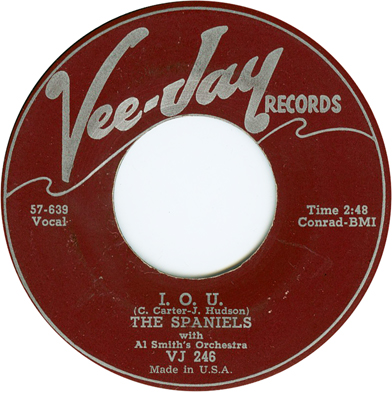
"Everyone's Laughing" and "I. O. U." were released on Vee-Jay 246 around April 1, 1957. Vee-Jay 246 was in a batch of releases first mentioned in Cash Box for April 6, 1957 (p. 36). The single got a solo ad in Cash Box for April 27, 1957 (p. 43). After sales picked up somewhere, solo ads ran in Cash Box for June 8 (p. 28) and June 15, 1957 (p. 54). Al Smith's Orchestra is credited on the label.
"I Lost You" was released on Vee-Jay 264 in December 1957; no credits to Al there. The single was advertised in Cash Box on February 1, 1958 (p. 51), again on February 15 (p. 41), on February 22 (p. 45), and on March 15 (p. 28).
Vee-Jay LP 1024 is called The Spaniels; it was released in 1960, a year Vee-Jay was getting busy with LPs. Famous Groove FG.971002 is a French compilation called Vee-Jay Doo Wop Volume 2: Bim Bam Boom! It was released in 1997. Collectables CD 7205, Vee-Jay Rhythm & Blues: The Early Years Part Two and CD 7244, The Very Best of the Spaniels Part 2 are 2000 releases.
"Everyone's Laughing" includes a solo by Lucius Washington; Mac Easton is not audible on this number. Little Wash also solos on "I. O. U." There are no instrumental solos on "I Lost You" or "Lovely Way."
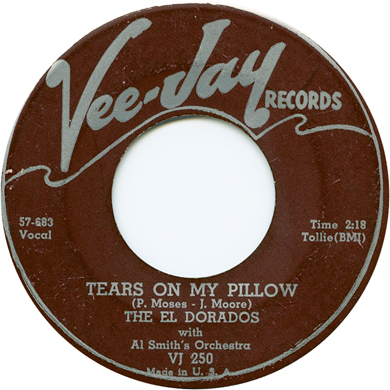
The El Dorados: Pirkle Lee Moses, John McCall, Doug Brown, Teddy Long, Johnny Carter (voc) acc. by Al Smith Orchestra: Al Smith (ldr); Lucius Washington (ts); McKinley Easton (bars); Horace Palm (p); Lefty Bates (eg); prob. Quinn Wilson (b); Vernel Fournier (d).
Universal Recording, Chicago, April 18, 1957
| 57-682 | Trouble Trouble | Charly LP 1022, Vee-Jay NVD2-702, Collectables CD 7245 | |
| 57-683 | Tears on My Pillow (P. Moses - J. Moore) | Vee-Jay 250, Charly CPCD 8000, Vee-Jay NVD2-702, Collectables CD 7245 | |
| 57-684 | A Rose for My Darling (P. Moses) | Vee-Jay 250, Solid Smoke LP 8025, Collectables CD 7245 | |
| 57-685 | Language for Love | Vee-Jay NVD2-715, Famous Groove FG 971011 [CD] |
Information about this edition of the El Dorados comes from the booklet of Charly CPCD 8000, a doo-wop collection called Zoom, Zoom, Zoom released in 1993. According to its booklet, when Delecta "Dee" Clark of the Kool Gents went solo, the Kool Gents' other members were "mollified when it was suggested that they join Pirkle Lee Moses to form a new El Dorados." This lineup recorded the above tracks. Other personnel are from the MFD Files.
Vee-Jay 250 was a single released in June 1957, according to Ferlingere. Release dates from this period are harder to pin down because of a decision that Vee-Jay made, a couple of months earlier, to give every new single a four-week trial run in Chicago (and with Chicago area radio stations) before rolling it out nationally. In Cash Box for June 29, 1957, Vee-Jay 250 was "reported going like hot-cakes in Chi area with national release date set for very near future (three weeks)" (p. 46). Some records released under this policy didn't do well in Chicago and never got beyond the Chicagoland release, so we'll use the Chicago date when we know it.
Vee-Jay NVD2-715, A Taste of Doo Wop: Volume Two, was released in 1993. Collectables CD 7245, The Very Best of the El Dorados, is a release from 2000.
"Tears on My Pillow" has a short tenor sax solo by Lucius Washington.
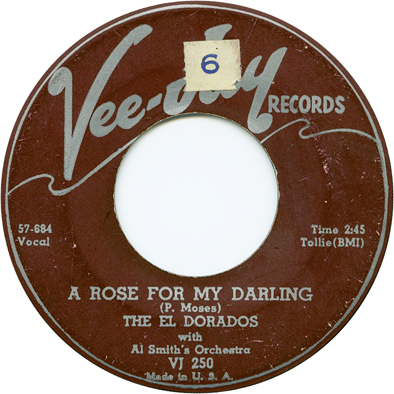
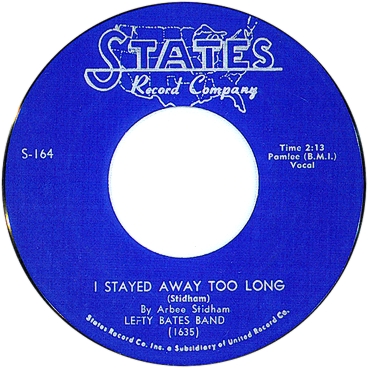
Arbee Stidham (voc); The Earls (vocal group); with Lefty Bates (rhythm eg, ldr); Earl Hooker (lead eg); Eddy "Sugarman" Penigar (ts); Tommy "Mad Man" Jones (bars); unidentified (p); Al Smith (b); Fred Below (d).
Universal Recording, Chicago, July 12, 1957
| 1634-? | Look Me Straight in the Eye (Stidham) [AS voc] | States 164, Crown Prince [Swe] IG-404, Blue Moon BMCD 6039 | |
| 1634-5 | Look Me Straight in the Eye (Stidham) [AS voc] | Delmark DE-717 [CD], Blue Moon BMCD 6039 | |
| 1635-? | I Stayed Away Too Long (Stidham) [AS voc] | States 164, Crown Prince [Swe] IG-404, Blue Moon BMCD 6039 | |
| 1635-4 | I Stayed Away Too Long (Stidham) [AS voc] | Delmark DE-717 [CD], Blue Moon BMCD 6039 | |
| 1635-9 | I Stayed Away Too Long (Stidham) [AS voc] | Pearl PL-17, Delmark DE-717, Blue Moon BMCD 6039 | |
| 1636-9 | Meet Me after School [E voc] | Delmark DE-776 [CD] | |
| 1637-5 | I Love You So [E voc] | Delmark DE-776 [CD] |
Our session information is drawn from Sebastian Danchin, Earl Hooker: Blues Master (Jackson: University of Mississippi Press, 2001). Earl Hooker is referred to by name in some studio chatter before 1635 take 9. Danchin does not mention the pianist, however. On the two sides by the Earls (who were presumably named after Earl Hooker) the guitarists are in a support role only—no solos.
States 164 was a single released in 1957; thanks to Otto Flückiger for a dub. Crown Prince IG-404, Arbee Stidham, was a Swedish LP release from 1982. Pearl PL-17 was a various-artists LP collection issued in 1989; Delmark DE-717, Long Man Blues, is an expanded edition of Pearl PL-17 on CD from 2000. Part of the first Arbee Stidham series on CD, Blue Moon BMCD 6039, Arbee Stidham, The Complete Recordings 1947-1957: Vol. 2 (1951-1957) was a 2004 release.
The sides by the Earls (the most modern-sounding vocal group to be recorded by Leonard Allen) were finally released in 2004, on Delmark DE-776, Tell Me: The Five C's and Other Great Groups on United. Sugarman Penigar gets tenor solos on both sides.
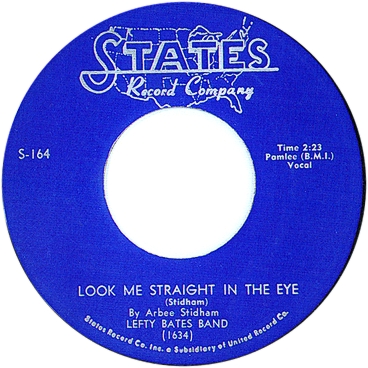
The session date and the tracks by the Earls are drawn from Bob Koester's discography of the United and States labels (Blues Unlimited, January/February 1977).
The last of Leonard Allen's vocal groups to record, the Earls were also the most modern. "Meet Me after School" sounds very much like what the El Dorados might have been putting out. "I Love You So" is a ballad in which the group sings with élan and vigor. Sugarman Penigar's solo is particularly pleasing on "Meet Me after School." Given the group's name, Hooker may have brought them to the session. These sides should have never been left in the can, but his company was faltering, and Allen probably chose not to release an unknown group on the market.
In fact, Arbee Stidham's single on States 164 was the very last to be issued on that label. United issues dribbled on into the fall. By the end of 1957, Leonard Allen had shut down the United and States operations. From then on, all of Al Smith's musical activity took place at Vee-Jay.
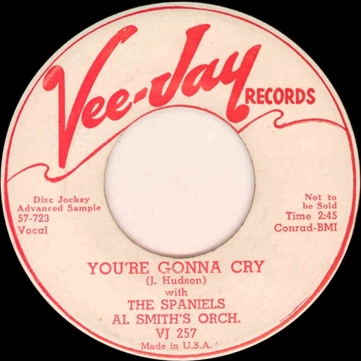
The Spaniels: James "Pookie" Hudson, Carl Rainge, Don Porter, James "Dimples" Cochran, Gerald Gregory (voc) with Al Smith and his Orchestra: Al Smith (ldr); Lucius Washington (ts); Marcus Johnson (bars); James Craig (p); Ace Lambert (eg); Lefty Bates (eg); prob. Quinn Wilson (b); Al Duncan (d).
Universal Recording, Chicago, July 30, 1957
| 57-722 | I Like It like That (Cochran-Moses-Carter) | Vee-Jay 310, Charly LP 1021, Charly CD 222, Vee-Jay NVD2-714, Collectables CD 7243 | |
| 57-723 | You're Gonna Cry (Hudson) | Vee-Jay 257, Lost Nite LP 137, Charly LP 1021, Solid Smoke LP 8028, Charly CD 222, Vee-Jay NVD2-704, Collectables CD 7243 | |
| 57-724 | Lucinda (Hudson) | Charly CD 222, Vee-Jay NVD2-714 |
Our session information comes from the MFD Files. The Spaniels' line-up is from Doowop: The Chicago Scene. Vee-Jay 257 with "You're Gonna Cry" was being talked up in mid-August (Cash Box, August 13, 1957, p. 40) and was released in September 1957. It was reviewed in Cash Box on October 5, 1957 (p. 60). The coupling, "I Need Your Kisses," was from the session of November 5, 1956 (see above).
Vee-Jay 310 was a single released in January 1959. On it "Like That" was credited to The Spaniels; the coupling, a newly recorded rendition of "Trees," to The Spaniels featuring Pooky.
Charly CD 222, The Spaniels Play It Cool, was released in 1990. Collectables CD 7243, The Very Best of the Spaniels Part 1, is a 2000 release.
"You're Gonna Cry" has no instrumental solos. "I Like It like That" and "Lucinda" feature strong solos by Little Wash and stinging guitar accompaniment by Lefty Bates and Ace Lambert. The baritonist could pass for Mac Easton, but there are no baritone solos on the session.
Priscilla Bowman was born Priscilla I. Mills in Quindaro Township, Kansas City, Kansas, on May 30, 1928 (our thanks to Marv Goldberg for the correct location and date). She began singing with the Jay McShann band in the early 1950s and was with the band when Vee-Jay signed it in 1955.
Priscilla Bowman's first two sessions for Vee-Jay in Chicago were as part of the Jay McShann Orchestra. On September 4, 1955, Jay's touring band (except for Alrook "Al" Duncan, who sat in for his regular drummer) cut 55-314 through 55-321. Vee-Jay 155, "Hands Off" b/w "Another Night" (both sung by Priscilla Bowman) reached #1 on the R&B charts. On January 31, 1956, the same ensemble (with the addition of another saxophonist) cut 56-396 through 399, all four of which featured her vocals. Her other vocal numbers with McShann weren't hits; neither were McShann's instrumentals. When McShann's contract came up for renewal in August or September 1956, Vee-Jay dropped him and signed Bowman as a solo artist. So her next session was directed by Al Smith.
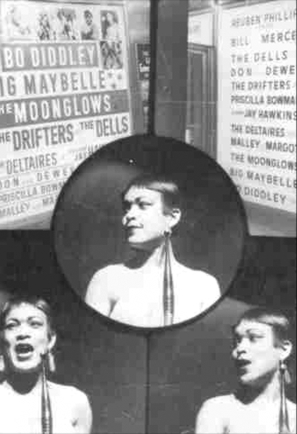
Priscilla Bowman (voc except -1); with Al Smith (ldr); Lucius "Little Wash" Washington (ts); Marcus Johnson (ts except -1); McKinley Easton (bars except -1); Horace Palm (p); Lefty Bates (eg); prob. Quinn Wilson (b); Al Duncan (d).
Universal Recording, Chicago, August 13, 1957
| 57-729 | Yes, I'm Glad (Bowman) | Falcon 1004, Charly CRB 1079, Sounds Good LP 5008, Popcorn 6004 [CD] | ||
| 57-730 | A Spare Man (Bowman) | Falcon 1004, Charly CRB 1079, Sounds Good LP 5008, Supersonic FV 1178 [LP], Collectables CD 7205, Buffalo Bop [G] BB-CD 55163, Popcorn 6004 [CD] | ||
| 57-731 | Sugar Daddy (Bowman)^ | Falcon 1008, Sounds Great LP 5008 | ||
| 57-732 | Don't You Come in Here (Bowman)^ | Falcon 1008, Sounds Great LP 5008 | ||
| 57-733 | Jammin' for Diggy -1* | Top Rank [F] RLP 111 |
Our session information comes from Leadbitter and Slaven, 1987; however, LS give the titles as preserved in the files, not those used on the labels. LS have "Yes I'm Glad (Everything's Alright)," "Keep a Spare Man," and "Don't You Come in Here." Cash Box for April 20, 1957 (p. 46) had Jimmy Bracken traveling to Kansas City "to make plans for coming session with Priscilla Bowman." Plans were made in KC, but the session was made in Chicago.
Falcon 1004 was issued in 78 and 45 rpm. "Everything's Alright" has been as the title on reissues, but on Falcon 1004 it's "Yes, I'm Glad." Falcon 1004 was released in September 1957. It was "skedded for immediate release" according to Cash Box for September 21 (p. 52). Billboard reviewed it on September 30 (p. 61) and Cash Box got to it on October 5, 1957 (p. 60). It was advertised in Billboard on October 7, 1957 (p. 61) and in Cash Box on October 19 (p. 45) and November 2 (p. 45).
Falcon 1008 may be the scarcest Priscilla Bowman single; its two sides have been reissued just once. It was released in January 1958 (Cash Box, January 25, p. 50), and got one company ad (the next week in Cash Box, February 1, 1958, p. 51). Courtesy of Victor Pearlin, we know what the 45-rpm labels looked like. Somebody may also have Falcon 1008 on a 78. One of the titles has been given as "Don't Come in Here." Falcon 1008 did not mention Al Smith on the labels.
We used to think that the early Falcons were re-pressed with Abner labels, but to our best current knowledge the only Falcon release followed by an Abner release on the same item was 1013. This was a huge hit still being pressed in quantity when the label changed its name.
Charly CRB 1079 was a compilation LP released in 1984 and titled Rock and Roll Mamas. It included 6 of Bowman's Vee-Jay, Falcon, and Abner sides. Sounds Great LP 5008 was released in 1986 as An Original Rock & Roll Mama. Rather surprisingly, the New Vee-Jay reissue activity from 1992 and 1993 never reached anything from this session. Supersonic FV 1178 was an LP, of unknown national origin, titled Hot Boppin' Girls, Volume 10; it was released in 1995. Collectables CD 7205 is from 2000 and is titled Vee-Jay Rhythm & Blues: The Early Years Part Two. Buffalo Bop BB-CD 55163, a CD from Germany, was titled Tough Dolls and released in 2003. Popcorn 6004, Rock 'n' Roll Mamas Volume 2, was a CD released in 2006.
Personnel from the MFD Files. MFD thought that Marcus Johnson might have been the bassist. As Bob Koester recalls, however, the Marcus Johnson who played on this session was a tenor saxophonist who sometimes doubled on baritone. During the vocal accompaniments, two tenors and a baritone can be heard, so... And there is nothing sufficiently distinguished about the bass lines to rule Al out. Maybe he had Red Holloway tune the bass for him on this occasion? Lucius Washington solos on "Yes, I'm Glad" and "A Spare Man."
After the vocal titles were completed, the remaining session time was used to produce 57-733, "Jammin' for Diggy," by Lucius Washington (aka "Little Wash") and the rhythm section only. It was released in 1962 by Kurt Mohr on Top Rank RLP 111, under Lucius Washington's name. In a performing career that lasted from the late 1940s to the late 1990s, Little Wash made just one other recording as a leader.
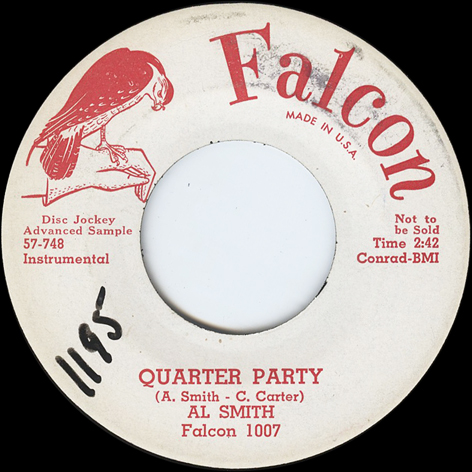
Dee Clark (voc -1) acc. by Al Smith's Orchestra: Al Smith (ldr); Lucius Washington (ts); unidentified (ts); McKinley Easton (bars); Earl Washington (p); Lefty Bates (eg); prob. Quinn Wilson (b); Al Duncan (d).
Universal Recording, Chicago, September 13, 1957
| 57-744 | Seven Nights -1 | Falcon 1005, Abner LP 2000, Charly LP 1113, Charly CD 69, Vee-Jay NVD2-703, Collectables CD 7250 | |
| 57-745 | Why Don't You Come Home -1 | Charly LP 1113, Charly CD 69 | |
| 57-746 | 24 Boy Friends -1 | Falcon 1005, Vee-Jay LP 1019, Charly LP 1113, Charly CD 69, Vee-Jay NVD2-703, Collectables CD 7265 | |
| 57-747 | Emma Jean -1 | Charly LP 1010, Vee-Jay NVD2-703 | |
| 57-748 | Quarter Party (A. Smith-C. Carter)* -2 | Falcon 1007 |
Basic session information is from the MFD Files. Ewart Abner was talking a month before this session about getting ready for it (Cash Box, August 13, 1957, p. 40). Falcon 1005 with "Seven Nights" was advertised in Billboard in December 1957. Company files gave the first title as "Seven Days, Seven Nights" and the third as "24 Boy Friends at Your Door."
Jepsen has Leon Washington again instead of Lucius on the instrumental. Jepsen says that "Party after Dark" (as titled in company files) is probably "Quarter Party" from Falcon 1007. We can change that to definitely. Bruyninckx lists this same item only under its title as released.
Falcon 1007 was released on 78 and 45 rpm in November 1957. Falcon 1007 was reviewed in Cash Box on November 30, 1957 (p. 50). Then in Billboard on December 2, 1957 (p. 60). The single was still being advertised in Cash Box on January 11, 1958 (p. 36).
"Quarter Party" is mostly a feature for Lucius Washington. The piece is taken out by two tenor saxes and no baritone is audible. We'd thought maybe Mac Easton switched to tenor for the instrumental. But three of the Dee Clark numbers (we've heard all but "Why Don't You") use two tenor saxes and Easton's baritone. No way of knowing who the second tenor was, because Lucius Washington gets all the solos.
Abner 2000 was an LP titled Dee Clark and released in 1959. Clark also got an LP on Abner 2002 that remains to be checked. Vee-Jay LP 1019, Dee Clark: You're Looking Good, was issued in 1960. Charly LP 1113, The Delectable Sound of Dee Clark, appeared in 1986. Charly CD 69, Raindrops. was released in 1987; the Vee-Jay reissue CD, NVD2-703, Rain Drops, was issued in 1993. Collectables CD 7265, You're Looking Good/Hold On, is a reissue from 2000 of two of Dee Clark's LPs on Vee-Jay. (Which Vee-Jay LPs? They need listing here as well.) Collectables CD 7250, Dee Clark/How about That appeared in 2000 and reissues Dee Clark's two Abner LPs.
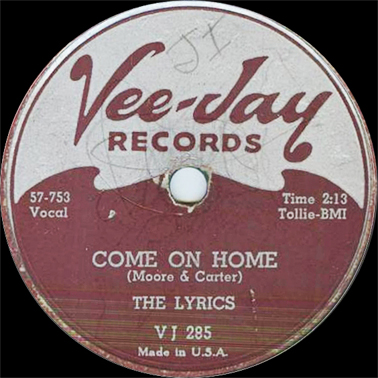
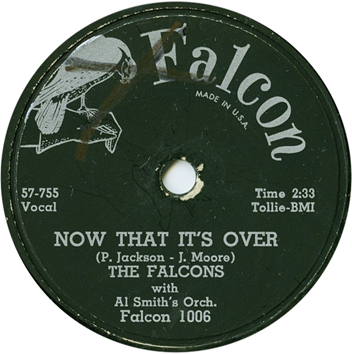
The Falcons: Bart Chatman, Kenny Winston, Ben Caldwell, Barry Austin, Paul Jackson (voc) acc by Al Smith Orchestra: Al Smith (ldr); George "Sonny" Cohn (tp); Lucius Washington (ts); McKinley Easton (bars); Earl Washington (p); Lefty Bates (eg); prob. Quinn Wilson (b); Al Duncan (d).
Universal Recording, Chicago, September 26, 1957
| 57-753 | Come On Home (J. Moore-C. Carter)* | Vee-Jay 285, Overseas Records [J] UPS 2274-V, Famous Groove FG. 971002 [CD], Collectables CD 7205 |
| 57-754 | My Only Love (P. Jackson - J. Moore) | Falcon 1006, Quality 1721, Overseas Records [J] UPS 2274-V, Famous Groove FG. 971002 [CD], Collectables CD 7205 |
| 57-755 | Now That It's Over (P. Jackson - J. Moore) | Falcon 1006, Quality 1721, Overseas Records [J] UPS 2274-V, Charly LP 1115, Vee-Jay NVD2-709, Famous Groove FG. 971002 [CD] |
| 57-756 | Why Don't You Stop (J. Moore-P. Jackson)* | Vee-Jay 285, Overseas Records [J] UPS 2274-V, Charly LP 1115, P-Vine Special [J] CD 1411, Famous Groove FG. 971002 [CD] |
Our session information is drawn from the MFD Files. Falcon 1006 was advertised in Billboard in December 1957. It was still in a company ad in Cash Box on January 11, 1958 (p. 36). We once thought that Falcon 1006 was re-pressed as Abner 1006 after the label's name was changed. Well, if you have Abner 1006, please show us a copy!
There are East Coast repros of Falcon 1006 (45s of course) on both red and black vinyl, according to Ferlingere. Quality 1721, mentioned by Ferlingere, was a Canadian single released at an unknown date.
Vee-Jay 285 was released in May 1958, according to Robert Ferlingere. We doubt that. One reason: in May 1958 Falcon was still Falcon. We haven't found any promotion for Vee-Jay 285 in Cash Box. However, Cash Box mentioned Vee-Jay 285 as a new item in Territorial Tips on August 23, 1958 (p. 41). It showed up in the Tips again on August 30 (p. 35) and on September 6 (p. 39). So we figure Vee-Jay 285, even with some sleeper effect, was released in July or August. On it the vocal group was identified as The Lyrics, without a credit to Al Smith's combo. From a photo of the 45 rpm release on 45cat.com, we can see that "Why Don't You Stop" is the correct title. It isn't "Stop." It also isn't "Stop (Why Don't You Stop)."
Overseas Records UPS 2274-V was a 1984 Japanese LP titled The Panorama of R&B Groups. Charly LP 1115, Dancin' and Romancin': 18 Doowop Diamonds from the Vee-Jay Vaults, was issued in 1986. P-Vine Special 1411 is a Japanese CD, released in 1992 as Lovers Prayer: Vee-Jay Records 10 Years of Chicago Street Corner, Vol. 1. Famous Groove FG.971002 is a French compilation called Vee-Jay Doo Wop Volume 2: Bim Bam Boom! It was released in 1997. Collectables CD 7205, Vee-Jay Rhythm & Blues: The Early Years, Part Two, is a 2000 release.
"Come On Home" and "My Only Love" include tenor sax solos by Little Wash (an excellent outing on "Home," while the solo on "My Only Love" is just a few bars). "Now That It's Over" is a ballad with no instrumental solos. "Why Don't You Stop," most unusually for a doo-wop record, has a prominent wa-wa muted trumpet obbligato by Sonny Cohn. He even gets a few bars of solo during the instrumental break in the middle.
On another page MFD list this group as The Lyrics (Bart Chatman, Kenny Winston, Ben Caldwell, Barry Austin, Paul Jackson). Their name was temporarily changed to The Falcons for the launch of the Falcon label. Ewart Abner Jr. had done the same thing earlier, when he was working for Chance and he turned a group called the El Travadors into The Five Chances.
Although Abner didn't seem to mind that there were other groups called the Falcons, including one that had a release on RCA Victor around the same time as Falcon 1006, he ended up changing the name of his label. Falcon became Abner, after Vee-Jay's management found out that a Falcon label already existed in Mission, Texas. The Abners was not deemed a suitable name for a doo-wop group... So the Falcons went back to being the Lyrics.
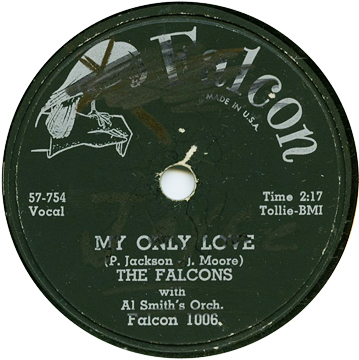
Billy "the Kid" Emerson (voc) acc by Al Smith Orchestra: Al Smith (ldr); George "Sonny" Cohn (tp); Lucius Washington (ts); McKinley Easton (bars); Earl Washington (p); Lefty Bates (eg); Matthew Murphy (eg); prob. Quinn Wilson (b); Al Duncan (d).
Universal Recording, Chicago, October 23, 1957
| 57-762 | Do Yourself a Favor (W. R. Emerson) | Vee-Jay 261, Charly CDGR 145 | |
| 57-763 | You Never Miss the Water (W. R. Emerson) | Vee-Jay 261, Charly CDGR 145, P-Vine Special [J] PCD 5271/4, Collectables CD 7272 | |
| 57-764 | Lucinda | unissued | |
| 57-765 | When It Rains It Pours | unissued |
Information from the MFD Files, except "When It Rains It Pours," from Leadbitter and Slaven 1987. LS 1987 give August 23 as the date, but that does not fit the matrix number sequence.
Vee-Jay 261 was released on 78 and 45 rpm; it was advertised in Billboard in December 1957. The title on the labels 261 is "You Never Miss the Water" and Al Smith is not credited; we previously had "You Never Miss Your Water" and a credit to the Al Smith orchestra. On DJ copies, at least of the 45, the title to "Do Yourself a Favor" was mistakenly repeated.
Charly CDGR 145 is a 2-CD set of blues material from the Vee-Jay label, released in 1998 under the title Chicago Blues: The Vee Jay Years. P-Vine Special PCD 5271/4 is a 4-CD various-artists set titled Vee-Jay, The Chicago Black Music and issued in 2000. Collectables CD 7272 is from the same year and is titled The Very Best of the Blues Volume 4
"Water" is an excellent Otis Rush-style soul blues featuring Matt Murphy's guitar; the horns do section work only. "Do Yourself a Favor" has a quick tenor sax intro by Little Wash and an all-too-brief solo. "When It Rains It Pours" was one of Emerson's specialties; he recorded the tune again for Vee-Jay in 1960, and, after the company decided not to issue it, he bought back the session and arranged for its release on Mad.
The El Dorados: Pirkle Lee Moses, John McCall, Doug Brown, Teddy Long, Johnny Carter (voc) acc. by Al Smith Orchestra: Al Smith (ldr); prob. Sonny Cohn (tp -1); Lucius Washington (ts -1); McKinley Easton (bars -1); Earl Washington (p); Lefty Bates (eg); Paul "Guitar Red" Johnson (eg); prob. Quinn Wilson (b); Al Duncan (d).
Universal Recording, Chicago, November 6, 1957
| 57-769 | Oh What a Girl (T. Long) -1 | Vee-Jay 302, Solid Smoke LP 8025, P-Vine Special [J] CD 1412, Vee-Jay NVD2-702 | |
| 57-770 | Lights Are Low -1 (L. Arnold) | Vee-Jay 302, Charly LP 1022, Vee-Jay NVD2-702, Collectables CD 7245 | |
| 57-771 | Always My Love -1 | P-Vine Special [J] CD 1412, Vee-Jay NVD2-702 | |
| 57-772 | Why Must I | P-Vine Special [J] CD 1412, Vee-Jay NVD2-702 |
Session information is from the MFD Files; however, MFD left out the trumpet player.
This group is the latter-day El Dorados, formed by a merger between Pirkle Lee Moses and members of the Kool Gents who were stranded after Dee Clark went solo. Vee-Jay 302 was a single released in November 1958, according to Ferlingere. The labesl to the Vee-Jay 78 rpm release show the correct matrix numbers, but incised in the vinyl are 58-769 and 58-770. See above for information on the P-Vine Special, Charly, and Vee-Jay reissues. Collectables CD 7245, The Very Best of the El Dorados, was released in 2000.
The horns are used on three tracks out of the four. They're confined to riffing, except for the trumpet intro on "Always My Love"; on "Lights Are Low" they are kept well in the background. Earl Washington is frequently entrusted with redundant piano triplets (e.g., on "Why Must I"). "Oh What a Girl" and "Lights Are Low" feature guitar solos (Guitar Red on "Oh What a Girl" and Lefty Bates on "Lights").
The Spaniels: James "Pookie" Hudson, Carl Rainge, Don Porter, James "Dimples" Cochran, Gerald Gregory (voc) with Al Smith (ldr); Earl Washington (p); Lefty Bates (eg); Matt Murphy or Paul "Guitar Red" Johnson (eg); Marcus Johnson (b); Al Duncan (d).
Universal Recording, Chicago, November 26, 1957
| 57-795 | Crazee Baby (T. Twiggs-C. Carter) -1 | Vee-Jay 264, Vee-Jay VJLP 1024, Charly LP 1021, Charly CD 222, Vee-Jay NVD2-714, Famous Groove FG 971010 [CD], Collectables CD 7244 | |
| 57-796 [see note] | Great Googley Moo (Hudson-Brooks) -1 | Vee-Jay 278 [see note], Charly LP 1021[?], Charly CD 222 [see note], Vee-Jay NVD2-709 [see note], Collectables CD 7243 [?] |
Our session information comes from the MFD Files, and the Spaniels' line-up from Doowop: The Chicago Scene.
Vee-Jay 264 with "Crazee Baby" was released at the end of December 1957. Ewart Abner was plugging it in the pages of Cash Box on February 1, 1958 (p. 46) and it was advertised in the same issue (p. 51). It was mentioned in another company ad on February 15, 1958 (Cash Box, p. 41), on on February 22 (p. 45), and on March 15 (p. 28).
Vee-Jay 278 with "Great Googley Moo" came out in May 1958.
Vee-Jay CD 709 was released in 1993 as A Taste Of Doo Wop—Volume One. Collectables CD 7243, The Very Best of the Spaniels Part 1, and Collectables CD 7244, The Very Best of the Spaniels Part 2, were 2000 releases.
MFD have "Marcus ?" on baritone saxophone on this date. According to Bob Koester, this was probably Marcus Johnson, who appeared on a number of sessions around this time playing tenor sax (including some with Muddy Waters for Chess) and "was tight with Al Smith." However, no baritone sax is audible on these sides, so we suspect that Johnson was playing bass instead.
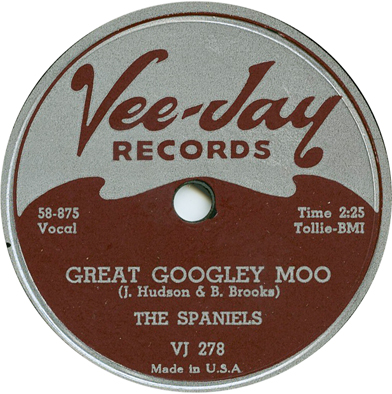
"Crazee Baby" has a brief duet passage for the guitarists.
"Great Googley Moo" exists in two versions. It is possible that 57-796 was shelved altogether in favor of two different takes of 58-875. However, the tamer sounding track that is billed as an "alternate" does seem to be from the session on which "Great Googley Moo" was redone in March 1958 as 58-875, just before the session by the new Magnificents listed below. MFD list the personnel as Lucius Washington (ts); Mac Easton (bars); Earl Washington (p); Paul "Guitar Red" Johnson (eg); Lefty Bates (eg); Quinn Wilson (b); Al Duncan (d). On the alternate version of "Googley," a piano solo replaces the guitar solo, and the vocal arrangement is also quite different. "Tina," which was recorded at the same March 1958 session and released in May 1958 on the other side of Vee-Jay 278, features relatively tame guitar playing. There are no horns on either version of "Googley."
What is billed on Charly CD 222 as the original version has a truly hot (more like wickedly distorted!) guitar part and solo that seem to be the work of Matt Murphy or Guitar Red. This version also appears on Vee-Jay NVD2-709, A Taste of Doo Wop Volume 1. While Vee-Jay 278 carries 58-875 for a matrix number, the original version is definitely the one that appears on the 78.
Vee-Jay 278 was listed as "New MOA Release" in Vee-Jay's ad in Cash Box for May 10, 1958 (p. 90).
The alternate version definitely appears on Vee-Jay NVD2-714, The Spaniels, Volume 2: Heart & Soul.
1958 started out busy for Al Smith. Up through August 7, he cut another 10 sessions, exclusively for Vee-Jay. Of Vee-Jay's output of approximately 175 sides from the beginning of the year through that date, Al was involved in about 15%. But Al's bass playing was growing ever more inadequate for the studio dates. And after he quit playing in the studio it becomes more difficult to trace which sessions he directed. Studio work was abundant at Vee-Jay, but control was passing to other directors with greater arranging skills, primarily Riley Hampton, Lefty Bates, and Sonny Thompson.
The El Dorados: Pirkle Lee Moses, John McCall, Doug Brown, Teddy Long, Johnny Carter (voc) acc. by Al Smith Orchestra: Al Smith (ldr); Lucius Washington (ts -1); McKinley Easton (bars -1); Earl Washington (celeste -2; p); prob. Paul "Guitar Red" Johnson (eg); Lefty Bates (eg); prob. Quinn Wilson (b); Al Duncan (d).
Universal Recording, Chicago, January 11, 1958
| 58-813 | Boom Diddle Boom [sic](T. Long-C. Carter) -2 | Vee-Jay 263, Charly LP 1022, P-Vine Special [J] CD 1412, Vee-Jay NVD2-702, Collectables CD 7245 | |
| 58-814 | Three Reasons Why (T. Long) -1 | Vee-Jay 263, Solid Smoke LP 8025, Vee-Jay NVD2-702, Collectables CD 7245 | |
| 58-815 | Lord Knows I Tried -2 | Solid Smoke LP 8025, P-Vine Special [J] CD 1412, Famous Groove FG 971010 [CD], Collectables CD 7245 |
Session information is from the MFD Files, which give just Lefty Bates on guitar. There are definitely two guitars on this date; we're pretty sure Paul Johnson is the louder of the two.
MFD give the the title of 58-814 as "Three Reasons Why I Love You"; the label on the original release says "Three Reasons Why." Information about this El Dorados line-up from the booklet of Zoom, Zoom, Zoom.
Vee-Jay 263 was a single promptly released in January 1958, according to Ferlingere. It was being plugged as a new release in Cash Box on February 8, 1958 (p. 68). See above for information about the Vee-Jay, Charly, and P-Vine reissues. Collectables CD 7245, The Very Best of the El Dorados, came out in 2000.
"Boom Diddle Boom" is dominated by Guitar Red, who contributes a solo in emulation of Chuck Berry. There are no other instrumental solos. The horns are confined to riffing in response to the refrain (as sung, it is "boom diddy boom," which is how Cash Box spelled the title when it announced its release), are way in the background on "Lord Knows," and lay out entirely on "Three Reasons Why." MFD list Sonny Cohn on trumpet but he isn't audible.

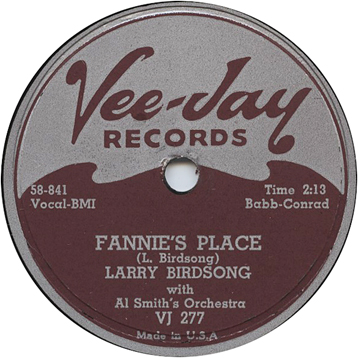
Larry Birdsong (voc); Al Smith (ldr); Lucius Washington (ts); McKinley Easton (bars); Earl Washington (p); Lefty Bates (eg); prob. Quinn Wilson (b); Al Duncan (d).
Universal Recording, Chicago, January 30, 1958
| 58-841 | Fannie's Place (Birdsong) | Vee-Jay 277, Charly CRB 1106, P-Vine Special [J] PCD 5271/4 | |
| 58-842 | Nothing but a Fool | Charly CRB 1106, P-Vine Special [J] PCD 5271/4 | |
| 58-843 | Goodbye Goodbye (Birdsong) | Vee-Jay 277, Charly CRB 1106 | |
| 58-844 | I'll Run My Business | Charly CRB 1106, P-Vine Special [J] PCD 5271/4 |
All of our session information is from Jepsen's Jazz Records; according to MFD as well as the labels to original release, the session was led by Al Smith. Vee-Jay 277 was a single that came out around March 1958. Charly CRB 1106 R&B Volts From The Vee-Jay Vaults is a Vee-Jay R&B compilation released in 1985; the other artists were Hank Ballard and the Midnighters, Dillard Crume Jr., Miss Mello & Heavy Drama, Kip Anderson, and the Five Royales. P-Vine Special PCD 5271/4 is a 4-CD box of Vee-Jay blues and R&B, issued in 2000 and titled Vee-Jay, The Chicago Black Music.
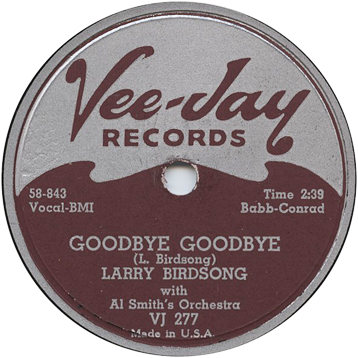
Larry Birdsong (whose previous session for Vee-Jay was cut in New Orleans) sounds like Otis Rush gone rockabilly. "Fannie's Place" is pure rock and roll; "Goodbye, Goodbye" is more like soul blues. These sides are a very good example of Lefty Bates' session work. Lefty solos on "Fannie's Place," "Ain't Nothing but a Fool," and "I'll Run My Business." Lucius Washington also gets a solo on "Fannie's Place," but the saxes are otherwise restricted to riffing on this session.
The Dells: Marvin Junior, Verne Allison, Mickey McGill, Johnny Funches, Chuck Barksdale (voc) acc. by Al Smith and his Orchestra: Al Smith (ldr); Lucius Washington (ts); Kirk Davis (prob. ts); McKinley Easton (bars); Earl Washington (p); Lefty Bates (eg); prob. Quinn Wilson (b); Al Duncan (d).
Universal Recording, Chicago, February 5, 1958
| 58-851 | Baby, Open Up Your Heart (M. McGill) | Vee-Jay 324, Vee-Jay LP 1010, Charly CRB 1056, Vee-Jay NVD2-701, Black Tulip 2636302 [CD], Collectables CD 7246 | |
| 58-852 | What You Say Baby (K. Davis) | Vee-Jay 274 | |
| 58-853 | Someone to Call Me Darling | Solid Smoke LP 8029 |
Session information is from the MFD Files. Vee-Jay 274 was a single released in March 1958; the company advertised it in Cash Box on March 15 (p. 28). The flip was a number called "The Springer"; with matrix number 58-858, it must have been done a few days later with a different band.
Vee-Jay 324 appeared in September 1959, according to Ferlingere. Charly CRB 1056 Rockin' on Bandstand is a compilation of Dells recordings for Vee-Jay. It was released in 1985. Collectables CD 7246, The Very Best of the Dells, is a release from 2000.
MFD list Kirk Davis as playing an unknown instrument. He was probably the second tenor saxophonist on this date. Little Wash has a tenor solo on "Baby Open Up Your Heart." According to the MFD files, Lefty Bates solos on 58-852.
Allison first got some attention in the trades in January 1957, when two of his sides appeared on Decca 30185 (Cash Box, January 26, 1957, p. 14). Decca 30185, both sides written by Jarrett, was reviewed in Cash Box on February 9, 1957 (p. 44).
Allison cut his first session for Vee-Jay (57-713 through 57-716) in July 1957 with unidentified studio musicians: trumpet, tenor sax, organ, piano, electric guitar, bass, and drums (not all instruments are present on each cut). From this session "You Can Make It If You Try" reached the Top 5 on Billboard's R&B chart and the Top 40 on the pop chart. Leadbitter and Slaven 1987 give the location as New Orleans; however, The Vee-Jay Story by Mike Callahan makes it clear that the session was done in Nashville with production by the Babb brothers, and studio musicians from that locale.
57-715, "Why Do You Treat Me So Cold," and 57-716, "Let's Sit Down and Talk It Over," as they are called in the files, were not paired on Vee-Jay 286, as claimed by LS 1987. What actually happened was that 57-716 from this session, "Let's Sit and Talk," was paired with "I Don't Know Why" from the May 19, 1958 session (verified from a copy of Vee-Jay 286 in Robert Pruter's collection). Vee-Jay put "Gene Allison with Al Smith's Orchestra" on both sides, but only the May 19, 1958 session (see below) actually involved Al Smith.
Riley Hampton told Walter C. Allen (in Hendersonia) that he hung up his saxophone in 1957 in order to concentrate on arranging and directing recording sessions. He may have been off by a year or so, however. An alto saxophonist is clearly audible on the next session.
We've learned that an Al Smith band was backing Gene Allison on tour before Smith and crew went into the studio with him for the first time. Cash Box (January 25, 1958) carried Ewart Abner's report that Gene Allison and Al Smith's band were "burning up the circuit" (p. 50). This the first report of Al Smith seriously touring; it may have something to do with Al getting credit on a Gene Allison side his band didn't play on (see above). We don't know whether Smith went back on the road with Allison again before he started working with Jimmy Reed.

Gene Allison (voc) with Al Smith (ldr); prob. Riley Hampton (as, arr); Lucius Washington (ts); McKinley Easton (bars); Maceo Woods (org); Sonny Thompson (p); Lefty Bates (eg); Quinn Wilson (b); Al Duncan (d).
Universal Recording, Chicago, February 6, 1958
| 58-854 | My Heart Remembers (J. Bracken) | Vee-Jay 273 | |
| 58-855 | Have Faith (S. Thompson-H. Stone) | Vee-Jay 273, Vee-Jay VJLP 1009, Collectables CD 7206 | |
| 58-856 | Tell the Truth | unissued |
Basic information from LS 1987. Vee-Jay 273 was a single released in March 1958. It was included in a company ad in Cash Box on March 15, 19558 (p. 28) and in further ads on March 29 (p. 22) and May 10, 1958 (p. 90). Vee-Jay LP 1009 was titled Gene Allison and released in 1959. Collectables CD 7206 is a collection released in 2000 under the title Vee-Jay Rhythm & Blues: The Soul Era Part One.
The alto sax is not credited in Lord or LS 1987. It appears to be the contribution of Riley Hampton, who was becoming active as an arranger for Vee-Jay around this time. Sonny Thompson, whose main gig in 1958 was with Federal, was heavily involved in Gene Allison's Vee-Jay sessions, playing on some of them and writing songs for most of them. There are no instrumental solos on "Have Faith."

In 1958, Al Smith hung up his bass as far as studio work was concerned. That makes attributing sessions to him rather difficult, unless they were explicitly credited to Al Smith and his Orchestra. There may be other sessions from 1958 and 1959 that Smith led for Vee-Jay, but the MFD Files list only the instrumentalists; a non-playing, non-arranging leader usually leaves no trace. For instance, Al Smith may have supervised the March 1958 session by the Spaniels that made "Tina" (58-876) and remade "Great Googley Moo" (58-875). This immediately preceded the session by the latter-day Magnificents, but we lack confirmation from label copy or other sources.
The Magnificents: four unidentified males (voc); prob. accompanied by Al Smith (ldr); unidentified (ts -1); prob. McKinley Easton (bars -1); unidentified (p); prob. Matt Murphy (eg); prob. Quinn Wilson (b); prob. Al Duncan (d).
Universal Recording, Chicago, March 1958
| 58-878 | Don't Leave Me (P. Boyd - L. Reed) | Vee-Jay 281, Collectables CD 7205 | |
| 58-879 | Let's Do the Cha-Cha (Nance-Boyd) -1 | Vee-Jay 367 | |
| 58-880 | Rosebud | Oldies 45 [?] | |
| 58-881 | Ozeta (Nance-Boyd-Moore) -1 | Vee-Jay 281 |
This is not the Johnny Keyes group, but an entirely different vocal quartet. The original Magnificents were blacklisted by Vee-Jay around May of 1957 after they sued the company over royalties. DJ Magnificent Montague, who owned the name, put together a new group called the Magnificents and recorded them in 1958. All four sides feature a tenor / falsetto lead vocalist. P. Boyd, Nance, L. Reed, and Moore may be the last names of some members of the group, but they give little to go on. For whatever reason, it appears Montague didn't claim any composer credits.
We got our matrix numbers and original release information from Ferlingere's discography, except that Ferlingere gives "It's No Wonder" as the title of 58-880 instead of "Rosebud." (He also says that it was issued on an Oldies 45 as by The El Dorados ... The Oldies 45 would date from the 1963 to 1965, and there are a couple that are split between the El Dorados and the Magnificents, but we haven't been able to identify this one yet).
Vee-Jay 281 was issued in April 1958, according to Ferlingere. We think May 1958 is more like it, as a single by the Magnificents was talked up on May 3, 1958 (Cash Box, p. 42) as one of several that Vee-Jay was releasing in time for the MOA convention. 281 was advertised on May 10, 1958 (Cash Box, p. 90) as "New MOA Release" and reviewed in Cash Box on May 31 (p. 48). Vee-Jay 367 (the other side was a reissue of "Up on the Mountain," by the original Magnificents) came out in October 1960. Collectables CD 7205 was released in 2000 and is titled Vee-Jay Rhythm & Blues: The Early Years Part Two.
There are no instrumental solos on any of these sides, and the saxes sit out on two of the four. Instrumentalists were identified by ear.
We previously thought that the Impressions (before they became known as Jerry Butler and the Impressions) recorded with Al Smith groups. However, a check of the MFD files shows that session 58-890 through 58-893 used a Lefty Bates band with Quinn Wilson on bass, and that 58-956 through 58-959 featured a completely non-Al Smith lineup with Count Hastings on tenor sax and Lloyd Mayers on piano.
Gene Allison (voc) with Al Smith (ldr); prob. Riley Hampton (as, arr); Lucius Washington (ts); McKinley Easton (bars); Maceo Woods (org); Clarence "Sleepy" Anderson (p?); Lefty Bates (eg); prob. Quinn Wilson (b); Vernel Fournier (d).
Universal Recording, Chicago, May 19, 1958
| 58-910 | I Don't Know Why (Sonny Thompson) | Vee-Jay 286, Vee-Jay VJLP 1009 | |
| 58-911 | Without You | unissued |
Our session information is from Leadbitter and Slaven, 1987. LS have the original release number correct for "I Don't Know Why"; it was paired on Vee-Jay 286 with "Let's Sit and Talk" from Gene Allison's first session, which was done in Nashville in July 1957, without Al Smith's involvement. Both sides of Vee-Jay 286 credit Al Smith with the accompaniment; for "Let's Sit and Talk" that's an obvious error.
Vee-Jay 286 was advertised in Cash Box on July 5, 1958 (p. 80), on July 12 (p. 30), and on July 19 (p. 41). Billboard carried an ad for it on July 28 (p. 42). It was reviewed in Cash Box on August 2, 1958 (p. 46). It was included in another company ad on August 23, 1958 (Cash Box, p. 32).
Vee-Jay LP 1009, Gene Allison, was given matrix numbers 59-1264 (K7OP-9761) for Side A and 59-1265 (K7OP-9762) for Side B. The K series numbers indicate that the records were pressed by RCA Victor. Both sets of matrix numbers point to a release in the fall of 1959.
Sleepy Anderson is credited with playing piano on this session by both Leadbitter and Slaven and Tom Lord, but he cannot be heard on "I Don't Know Why." There is an uncredited alto saxophone in the ensemble as well. Since the saxes are tightly arranged and play no solos on "I Don't Know Why," Riley Hampton is the most likely participant.
This appears to have been Lucius Washington's last Al Smith-led session for Vee-Jay. The company was now favoring Cliff Davis, whose more aggressive attack was considered more suitable for rock and roll.

Al Smith (ldr); Tommy Purksom (tp); Harlan "Booby" Floyd (tb); Cliff Davis (ts); McKinley Easton (bars); Earl Washington (p); Lefty Bates (eg); Quinn Wilson (b); Al Duncan (d, Latin perc).
Universal Recording, Chicago, June 3, 1958
| 58-924 | Christopher Columbus (Razaf-Berry) | Abner 1020 | |
| 58-925 | Wabash Blues (Ringle-Meinken) | Abner 1014 | |
| 58-926 | Left Field (C. Carter) | Abner 1014 |
Our session information is derived from Jepsen—except he left the rest of the line blank after 58-926! Bruyninckx provided comparable information and filled this line in. Bruyninckx gives Al Smith and not Quinn Wilson as the bassist.
Falcon 1013, "For Your Precious Love" by Jerry Butler, a huge hit, was rebranded as Abner 1013 in the middle of its run, in June 1958. That made 1014 the first 100% Abner. Bruyninckx says that "Left Field" was on Falcon 1014—it was really Abner 1014.
Abner 1014 and 1020 were singles released on 78 and 45 rpm. Abner 1014 was issued in August 1958. It was mentioned in a company ad for Vee-Jay-Abner in Cash Box, July 26, 1958 (p. 32) and reviewed in the trade magazine on August 16 (p. 16). Further ads, including a couple that atavistically referred to "Vee Jay-Falcon Records," ran in the next few weeks; for instance, in Cash Box for August 23, 1958 (p. 32). Abner 1014 was the best-seller among the company's Al Smith offerings, appearing for several weeks in a row in Cash Box's "Territorial Tips." The sales on 1014 encouraged the company to put Abner 1020 out in October 1958. But after one ad (Cash Box, October 4, 1958, p. 28) that pitched 1020 as a new release to watch for, Vee Jay-Abner seems to have quit on promoting the record.
"Left Field" is a cha-cha (the band's second; Al and company had laid one down during the January 1957 session). The horns play written ensembles (with some exposure for the trombone) and Al Duncan is featured on drums and Latin percussion. "Wabash Blues" is done Fats Domino style; it has a tenor sax lead and solo by Cliff Davis, a passage where Davis and Lefty Bates play together, and a strong counterline on the baritone sax, while Earl Washington is confined to those redundant piano triplets. "Christopher Columbus" also has a period rock and roll arrangement, and features Lefty Bates' guitar as well as Cliff Davis's tenor sax.

Very few of Al Smith's sessions for Vee-Jay were strictly instrumental outings. We wonder whether additional tracks with a vocal group or vocalist were cut at this session. It could be there were some and they were rejected.
About a year after the August 1957 session, Al Smith directed another session for Priscilla Bowman. Again, the results were artistically sound, but the company questioned their commercial prospects and there was one delayed release.

Priscilla Bowman (voc) with Al Smith (ldr); Cliff Davis (ts); Horace Palm (p); Lefty Bates (eg); Quinn Wilson (b); Al Duncan (d); The Spaniels: James "Pookie" Hudson, Carl Rainge, Don Porter, James "Dimples" Cochran, Gerald Gregory (voc).
Universal Recording, Chicago, July 30, 1958
| 58-973 | If I Had the Power | Sounds Great LP 5008 | |
| 58-974 | I Ain't Givin' Up Nothin' (Benton - Otis) | Abner 1018, Charly CRB 1079, Sounds Great LP 5008 | |
| 58-975 | A Rockin' Good Way (Otis - Benton - DeJesus) | Abner 1018, Charley CRB 1079, Sounds Great LP 5008, Vee-Jay NVD2-704, Vee-Jay NVD2-708, Vee-Jay NVS-2-3-400, P-Vine Special [J] PCD 5271/4, Collectables CD 7206, Shout! Factory 631048 [CD] | |
| 58-976 | Where Will It End? | Sounds Great LP 5008 |
Our session information is from Leadbitter and Slaven, Blues Records 1943-1970 A-K (1987). LS use file titles, including "I Ain't Giving Up Nothing" and "Wonder Where I Will End," instead of the label titles. "A Rockin' Good Way," which was later given the parenthetical extension ("To Mess Around and Fall in Love"), was cowritten by singer Brook Benton and producer Clyde Otis; in 1960, it would become a duet vehicle for Benton and Dinah Washington on Mercury.
Ewart Abner was talking the session up to Cash Box on August 9, 1958 (p. 38). But there was no hurry to put anything on the market. Abner, Bracken, and Carter were apparently too busy promoting records by The Spaniels, The Dells, Gene Allison, Jimmy Reed, and Wade Flemons on the parent label, and by Jerry Butler, Dee Clark, and the Impressions on Abner.
Seven months later, there was one single from the sesssion: Abner 1018, released in March 1959. It was advertised in Cash Box on March 21, 1959 (p. 39) as Ewart Abner told the trade scribes it had been released "'tother day" (p. 34); an ad followed in Billboard on March 23 (p. 30). Abner 1018 was reviewed in Billboard on March 23, 1959 (p. 52) and in Cash Box on March 28 (p. 56). It got an Award o' the Week from Cash Box but the only evidence of sales was a couple of mentions in Territorial Tips.
Charly CRB 1079 was a compilation LP released in 1984 and titled Rock and Roll Mamas. It included 6 of Bowman's Vee-Jay, Falcon, and Abner sides. Sounds Great LP 5008, An Original Rock & Roll Mama, was released in 1986. Vee-Jay NVD2-708, The Unavailable 16 and The Original Nitty Gritty, was a various-artists CD released in 1993, as was the 3-CD set Vee-Jay NVS2-3-400, The Vee Jay Story: Celebrating 40 Years of Classic Hits. Vine Special PCD 5271/4, Vee-Jay, The Chicago Black Music, is a 4-CD box issued in 2000. Collectables CD 7206 is a collection released in 2000 under the title Vee-Jay Rhythm & Blues: The Soul Era Part One. Shout! Factory 631048, Vee-Jay: The Definitive Collection, was a 4-CD set released in 2007.
The Spaniels' lineup was presumably the same as on their most recent session under their own name.
Priscilla Bowman's last session for Vee-Jay, which took place on July 30, 1959, was led by Riley Hampton. It yielded her final single, Abner 1033, with a date of relese not yet known to us; it could have been held into early 1960. Her career as a commercial recording artist had lasted a little over four years. Bowman continued to work through the mid-1970s, and was reunited with Jay McShann on more than one occasion. Her only other recording that we know of was a limited-issue LP recorded in Kansas City by pianist Roy Searcy. Roy Searcy and Friends: Live Jam Session President Hotel 1976 was released, probably in early 1977, on Stage Three Sound RS 111276. She retired from music, dying of lung cancer on July 24, 1988, at the age of 60. A good, up-to-date discography is avalable at the Wangdangdula site: http://wdd.mbnet.fi/priscillabowman.htm.
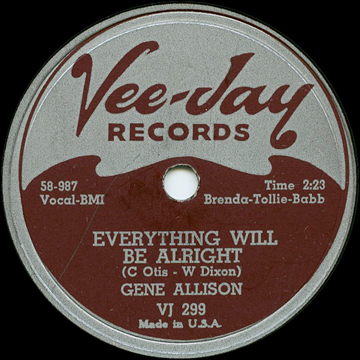
Gene Allison (voc); Al Smith (prob. ldr); Riley Hampton (as -1; ts -2; arr); Cliff Davis (ts); McKinley Easton (as, bars); Earl Washington (p); Lefty Bates (eg); Quinn Wilson (b); Al Duncan (d); unidentifed female chorus -3.
Universal Recording, Chicago, August 7, 1958
| 58-987 | Everything Will Be Alright [sic] (C. Otis-W. Dixon) -1, 3 | Vee-Jay 299, Vee-Jay LP 1009 | |
| 58-988 | I Believe in Myself (T. Jarrett) -2 | Vee-Jay 317, Vee-Jay LP 1009 | |
| 58-989 | I'm a Fool for Wanting You -2 (S. Lewis) | Vee-Jay 299 |
Our information on this session is from Lord's Jazz Discography; the session was probably led by Al Smith. Riley Hampton is not credited in Lord, but in fact there are three saxes on each cut (Mac Easton played alto and tenor, all right, but not simultaneously with the baritone, which Lord would have us believe), and an arranger's touch is being applied to the horn ensembles.
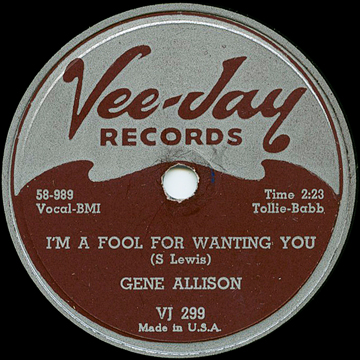
Vee-Jay 299 was a 78 and 45-rpm single released in September 1958. It was mentioned in a company ad in Cash Box on September 13, 1958 (p. 33). The company ran further ads on October 4 (Cash Box, p. 28), October 11 (Cash Box, p. 43) and October 18 (Cash Box, p. 32). Although the earlier ads in Cash Box mentioned only "I'm a Fool for Wanting You," "Everything Will Be All Right," as it is usually known, was a Top 20 R&B hit on the Billboard chart. There was a further mentions in a company ad on November 8, 1958 (Cash Box, p. 26).
Vee-Jay 317 was a single released in May 1959. Cash Box advertised it on May 30, 1959 (as "A New Gene Allison," p. 53) and again on June 6 (p. 9).
Vee-Jay LP 1009 was titled Gene Allison and released in the fall of 1959. On it, 58-987 appeared as "Everythings Alright." Oh well.
There are no instrumental solos on "Alright." "I Believe in Myself" sports several tenor sax breaks by Cliff Davis and a guitar break by Lefty Bates. Cliff Davis gets a short solo on "Fool."
For nearly three months, Al Smith was on no sessions that we are aware of. It appears he was on his first road trip leading Jimmy Reed's band. Cash Box (November 8, 1958, p. 46) has the bluesman "on a theatrical swing through the east with Al Smith and his band." The tour appears to have ended just in time for Smith to get in one more session with Gene Allison.
Gene Allison (voc); Al Smith (prob. ldr); Cliff Davis (ts); McKinley Easton (as, bars); Sonny Thompson (p); Lefty Bates (eg); Wayne Bennett (eg); Quinn Wilson (b); Al Duncan (d).
Universal Recording, Chicago, November 5, 1958
| 58-1032 | Reap What You Sow (R. Gaines) | Vee-Jay 305, Vee-Jay VJLP 1009, P-Vine Special [J] PCD 5271/4 | |
| 58-1033 | Tell Me the Truth (T. Jarrett) | Vee-Jay 305, Vee-Jay VJLP 1009 |
Our basic information is once again from Tom Lord's Jazz Discography, Volume 1.
Vee-Jay 305 was a 78 and 45-rpm single released in December 1958. On December 13, 1958 a Cash Box ad advised readers to "Watch for New Gene Allison Release!! (p. 31). Vee-Jay 305 was first advertised in Cash Box on December 27, 1958 (p. 6). It got another push in Cash Box on February 14, 1959 (p. 6) and on February 21 (p. 24).
Vee-Jay LP 1009, Gene Allison, came out in 1959. P-Vine Special PCD 5271/4 is a 4-CD box of Vee-Jay blues and R&B, issued in 2000 and titled Vee-Jay, The Chicago Black Music.
On "Reap What You Sow," Cliff Davis is prominently featured: he gets an intro, a long solo, and a tag. This is the last hurrah for an Al Smith saxophonist on a Vee-Jay release. "Tell Me the Truth" concentrates on the dual guitar lines of Wayne Bennett and Lefty Bates; Bennett seems to emulating a mandolin at times.
This seems to be the last Gene Allison session on which Al Smith led the band. Smith was now spending a lot of time on the road with Jimmy Reed. With Allison's next session of December 17, 1958, Lord has "Riley Thompson" taking over as pianist, arranger, and conductor and continuing in that role on the session of June 11, 1959. Lord is conflating Riley Hampton, the alto saxophonist and arranger, and Sonny Thompson, the pianist, who was also doing A&R work for Federal in Chicago at this time. Both of them were involved with the December 17, 1958 session (on which Thompson played piano and, at least on "Everybody but Me," Hampton probably conducted a female choir). On June 11, 1959, Allison again recorded with the Hampton-Thompson combine, with Hampton playing alto sax and arranging and Thompson playing piano; on June 12, 1959, the sessions continued with Earl Washington replacing Thompson at the piano. Cliff Davis was allotted at least one tenor sax solo on these sessions.
After his LP came out, Gene Allison faded fast, recording one more single for Vee-Jay in 1960. Another four tracks, which he recorded on April 20, 1961, remained unreleased. His career as a hitmaker was over. Gene Allison died of kidney and liver failure on March 6, 2004, in Nashville. He left his wife, Evelyn, 4 children, 14 grandchildren, and 3 great-grandchildren. (For biographical information on Allison, we relied on Phil Sweetland, "Gene Allison, 69, Soul Singer Who Fused Sacred to Secular," New York Times, Sunday, March 14, 2004, p. 25.)
In 1959, Vee-Jay's musical orientations were changing and the classic R&B accompaniment provided by Al Smith and his musicians was in less and less demand. Smith was 35 years old now. He couldn't read music and had quit playing his own instrument in the studio. His fortunes in music had always depended on his business sense. Meanwhile, Riley Hampton had established himself as an arranger and music director, able to provide the slicker backing that Vee-Jay now wanted for its vocal artists: more and more often Vee-Jay was using flutes and strings on its sides. In the spring of 1959 Smith, who had already been on tour with Jimmy Reed a couple of times, became Jimmy Reed's manager.
He was no longer working in the clubs; drummer Alvin Fielder, who arrived in Chicago in 1958, has no recollection of him as a bandleader. The last Chicago Defender advertisement with Smith's name was for a Valentine Special at the Pershing Ballroom (February 14 and 15, 1959).
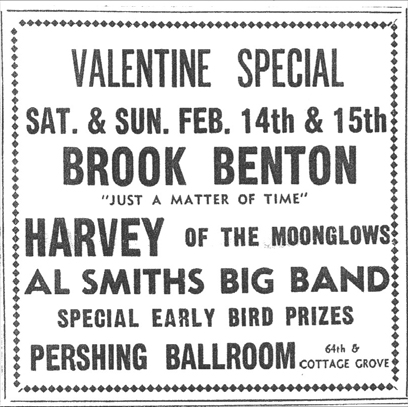
A farewell instrumental session was recorded for Vee-Jay. But as it was doing with some other R&B acts who in management's opinion were becoming dated (for instance, Tommy Dean), the company never used the sides.
Al Smith (ldr); George "Sonny" Cohn (tp); Norman Rich (as, ts); Earl Lavon "Von" Freeman (ts); McKinley "Mac" Easton (bars); Horace Palm (p); Lefty Bates (eg); Quinn Wilson (b); Al Duncan (d).
Universal Recording, Chicago, March 27, 1959
| 59-1112 | Jay's Jam | Vee-Jay (unissued) | |
| 59-1113 | Cool Blues | unissued | |
| 59-1114 | Indiana | unissued | |
| 59-1115 | South 2 West Blues | unissued |
All of our information comes from Jepsen. Al Smith seems to have reverted to his bebop octet lineup for this final session... Too bad none of it's ever been released.
Al Smith was managing bluesman Jimmy Reed, one of Vee-Jay's top sellers. In The Vee-Jay Story by Mike Callahan, Red Holloway recalls that Smith and the several of the regulars in the house band, including Red himself, spent much of 1959 on the road with Reed.
During Vee-Jay's remaining years, Al Smith was still around the company but no one seems clear what his exact role was. From the recollections of some Vee-Jay artists, such as John Lee Hooker, Smith hung out in the company offices and seemed to carry some management responsibilities. Apparently, Smith also did some production for the USA and Blues on Blues labels during this period. (A connection occasionally reported with the Prestige Bluesville operation is really about the singing Al Smith who recorded two soul-blues albums there.)
As Jimmy Reed's manager, Al Smith was responsible for leading Reed's band, which often had to play warmup numbers for extended periods of time while waiting for the undependable bluesman to show. Smith was still playing the bass during his earlier years with Reed (maybe he figured that the group didn't need a great bassist and wanted to avoid the expense of retaining someone with more skill on the instrument).
Jazz pianist Jodie Christian remembered his experience in the band as follows:
It was in the early '60s when I played with Jimmy Reed. Each time we went out on the road with Jimmy Reed we, the band members, would say this would be the last time. Then Al Smith, the band leader, would call and say that he would pick us up the next week at a certain time and we would be there. The group consisted of Phil Thomas, drums, Von Freeman, sax, Shaky (I can't remember his name), trumpet, Wayne Bennett, guitar, and myself. Al Smith was also the bass player.
Al played an upright bass without an amp. Al was not a bass player but there was something about his bass playing that was good. His timing was good and the way he played, you would think that he was playing correctly. The feeling was so good. Al didn't care what condition the bass was in. Once the sound post in the bass fell out of place but the way he played it was as though everything was all right.
Von and I would rush to a job and tune the bass before Al came to the bandstand. When Al came on the bandstand he would pick a few notes, grunt and start untuning the bass. On top of all of that he didn't have a cover for the bass.
The much-abused instrument was eventually put out of its misery, when an incompetent driver pulled the band's station wagon into a low-ceilinged garage while carrying the bass on a roof rack. Smith promptly invested in an electric bass but Christian didn't stick around to find out how he sounded on it. (We learned all of this from the late Charles Walton's interview with Jodie Christian, part of his invaluable set of Bronzeville Conversations.)
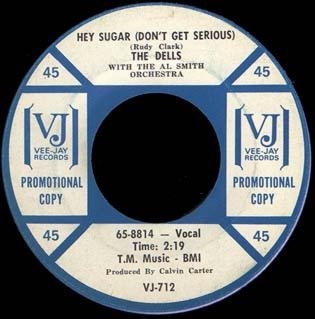
In 1965, Smith supervised at least one more vocal group session for Vee-Jay. On the single that was released from the session the band is referred to as the "Al Smith Orchestra," so we are listing it here.
The Dells: Marvin Junior (baritone lead); Johnny Carter (1st tenor); Verne Allison (2nd tenor); Mickey McGill (baritone); Chuck Barksdale (bass); with Al Smith Orchestra: musicians unidentified.
Universal Recording, Chicago, 1965
| 65-8814 | Hey Sugar (Don't Get Serious) (Clark) | Vee-Jay 712 | |
| 65-8815 | Poor Little Boy (Strong) | Vee-Jay 712 |
We don't know what other tracks (if any) were recorded at this session. The Dells had by this time evolved into a soul ensemble; we got the personnel for this edition of the group from Robert Pruter, Chicago Soul (Urbana: University of Illinois Press, 1991).
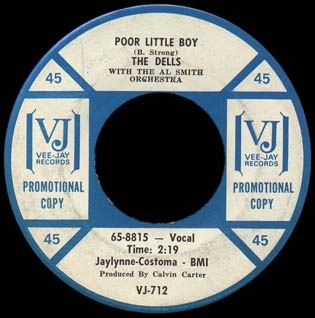
In 1965 and 1966, Al Smith produced two singles by the soul group The Steelers for Glow Star (a subsidiary of Al Benson's Crash label); later on, in 1969, he was listed as a co-composer of their hit song "Get It from the Bottom," which was released on the Date label (a Columbia subdiary). In 1966, he also was involved with the Exodus label, a short-lived revival of Vee-Jay that had to close when the parent company was declared bankrupt.
After the fall of Vee-Jay, Jimmy Reed quickly resurfaced at ABC Bluesway, where Smith became a producer. Smith handled sessions by Reed, John Lee Hooker, and other blues and R&B artists. His relationship with Hooker ended abruptly after one LP; Hooker found out that Smith was helping himself to some of the composer credits and promptly demanded a new producer. One suspects that when Hooker subsequently performed "Backbiters and Syndicators," Smith was one of those he had in mind. Al Smith and Johnny Pate produced several sessions by soul singer Betty Everett, a former Cobra and Vee-Jay artist, between 1966 and 1968.
Al Smith's business relationship with Jimmy Reed ended in 1971. During the frenetic final days of ABC (the same period during which the label's Impulse! division signed an ill-fated 21-album deal with El Saturn, the label operated by Sun Ra and Alton and Artis Abraham), Smith inked a 25-LP production deal in 1973 with the reactivated Bluesway operation. Twenty of these albums subsequently appeared. They were generally regarded as slapdash affairs, but they provided an opportunity for many bluesmen to record for a major label.
Al Smith died in Chicago, on February 7, 1974, of a heart attack. He had been suffering for some time from heart disease and diabetes.
Red Holloway, who contributed to so many sessions under Al Smith's leadership, died on February 25, 2012, at the age of 84. He had suffered a stroke and kidney failure.
Heartfelt thanks go out to Chris Trent for lending his keen ear, to Kurt Mohr who was responsible for the Vee-Jay portions of the MFD (Mohr-Flückiger-Demeusy) Files, and to Otto for being Otto.
The Angels (female vocal group) with Al Smith (ldr); unidentified ts, bars, p, eg, and d.
Oakland, California, October 1956
| 45-IR-105XX | Leaving You Baby | Irma 105 | |
| 45-IR-105X | Sha-Wa-Wa | Irma 105 |
The MFD Files list this session as by Al Smith & his Orchestra, so it was included in the earliest version of this discography. However, new information shows that these sides originated on the West Coast, and a listen confirms that they were not recorded by "our" Al Smith. The Irma label was part of the Bob Geddins combine, based in Oakland. Moreover, B-Flat Publishers, the listed publisher for the songs, was located in Oakland.
MFD give the date as 1957 and provide no specifics about the lineup. According to vocal group discographer Robert D. Ferlingere, the numbers MFD give for "Leaving You Baby" (12299) and "Sha-Wa-Wa" (12301) are not real matrix numbers, but "delta numbers," which were used on most West Coast pressings of the period and indicate pressing date. Delta #12146 is known for a pressing done on October 15, 1956 and #12658 is known to be from November 15, 1956.
The correct matrix numbers and label information are from Robert Ferlingere. He points out that the matrix numbers in the vinyl from this 45 rpm single don't match the label: "Leaving You Baby" has 45-IR-107-X in the vinyl, and "Sha-Wa-Wa" has 45-IR-107-XX, suggesting a change in release plans by the Irma organization.
Now that we have learned of a West Coast connection, we have to wonder whether this band might have been led by the singing Al Smith (aka Al King) from Los Angeles. But if that Al Smith was involved he didn't sing—only the four female vocalists are heard. There are baritone sax and guitar solos, but these are definitely not by Mac Easton or Lefty Bates. So the band was not led by Albert B. Smith from Chicago or Alvin K. Smith from Los Angeles. Was there still another Al Smith in Oakland?
Gribin and Schiff list these sides as by the Angels, one of 10 (!) different doo-wop groups to go by that name. And they list the date as 1956. However, they also identify these Angels as a male group led by Sonny Gordon.